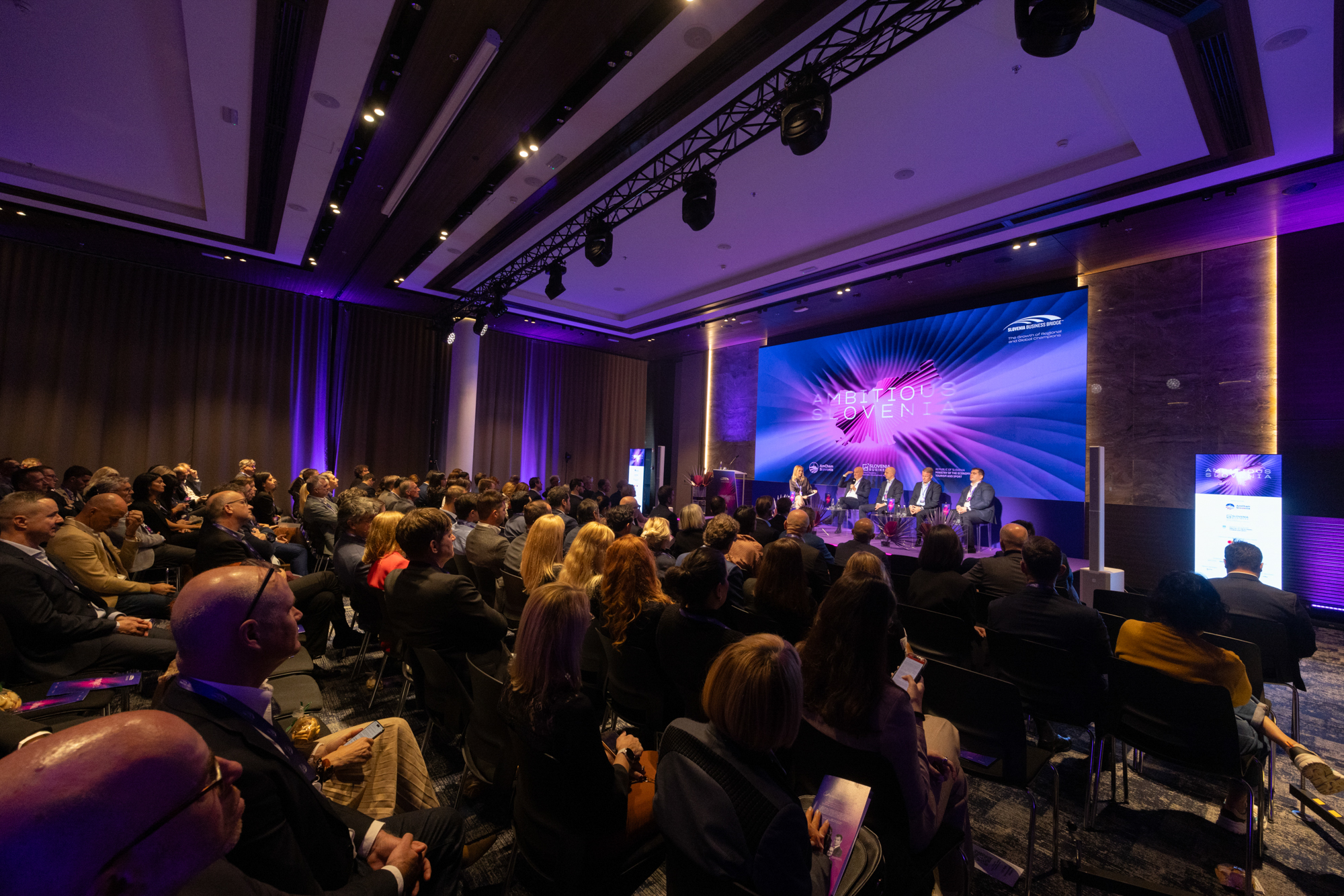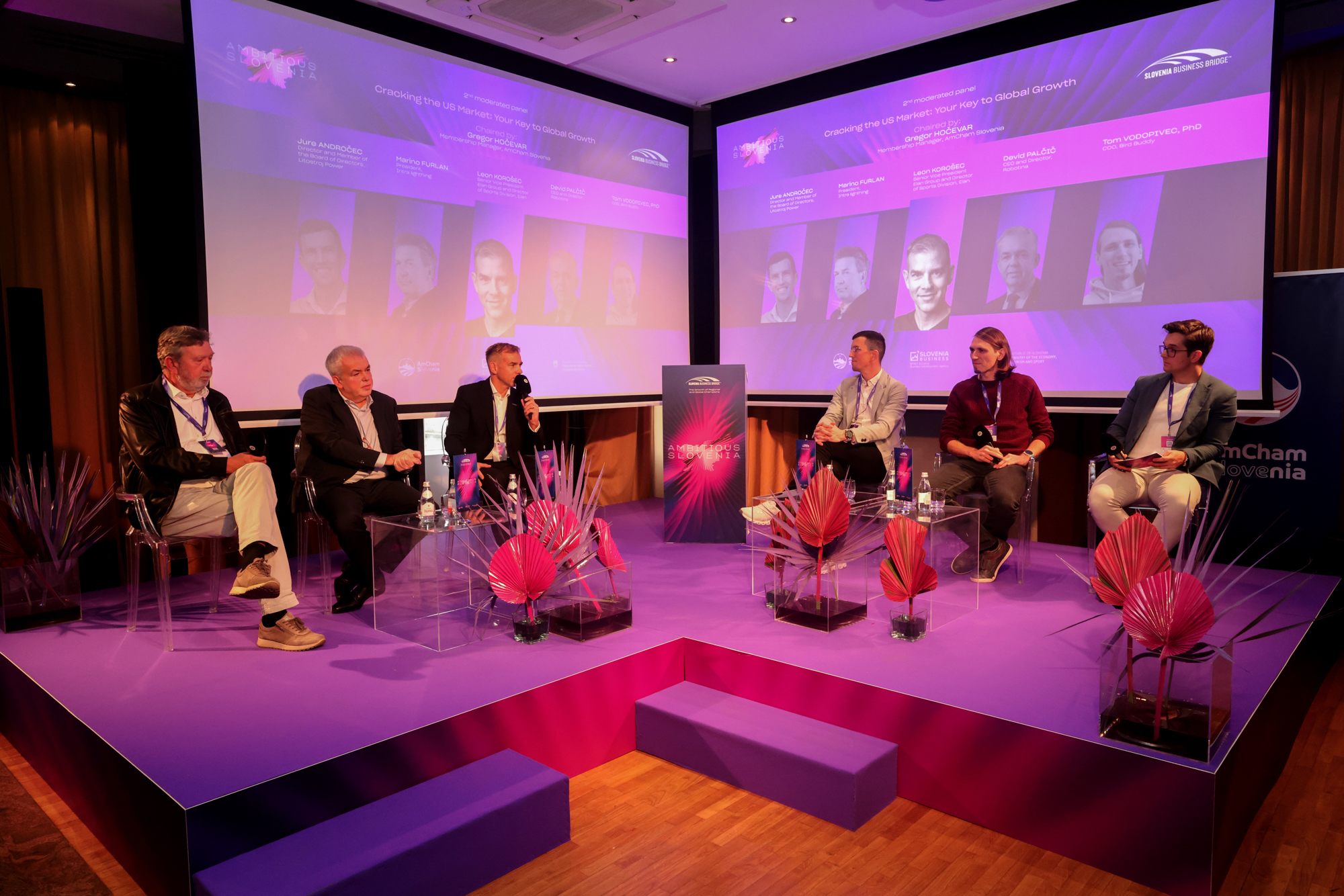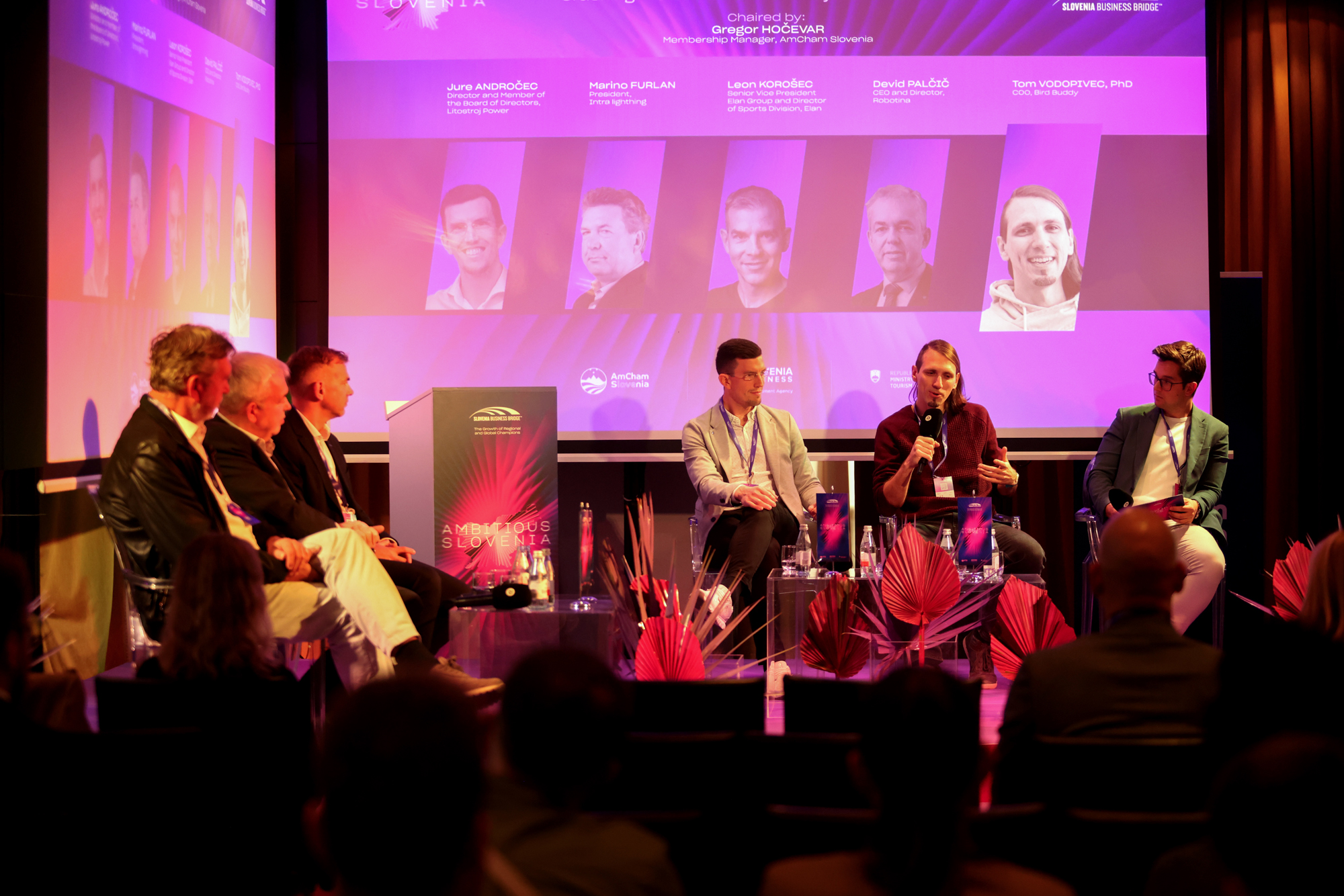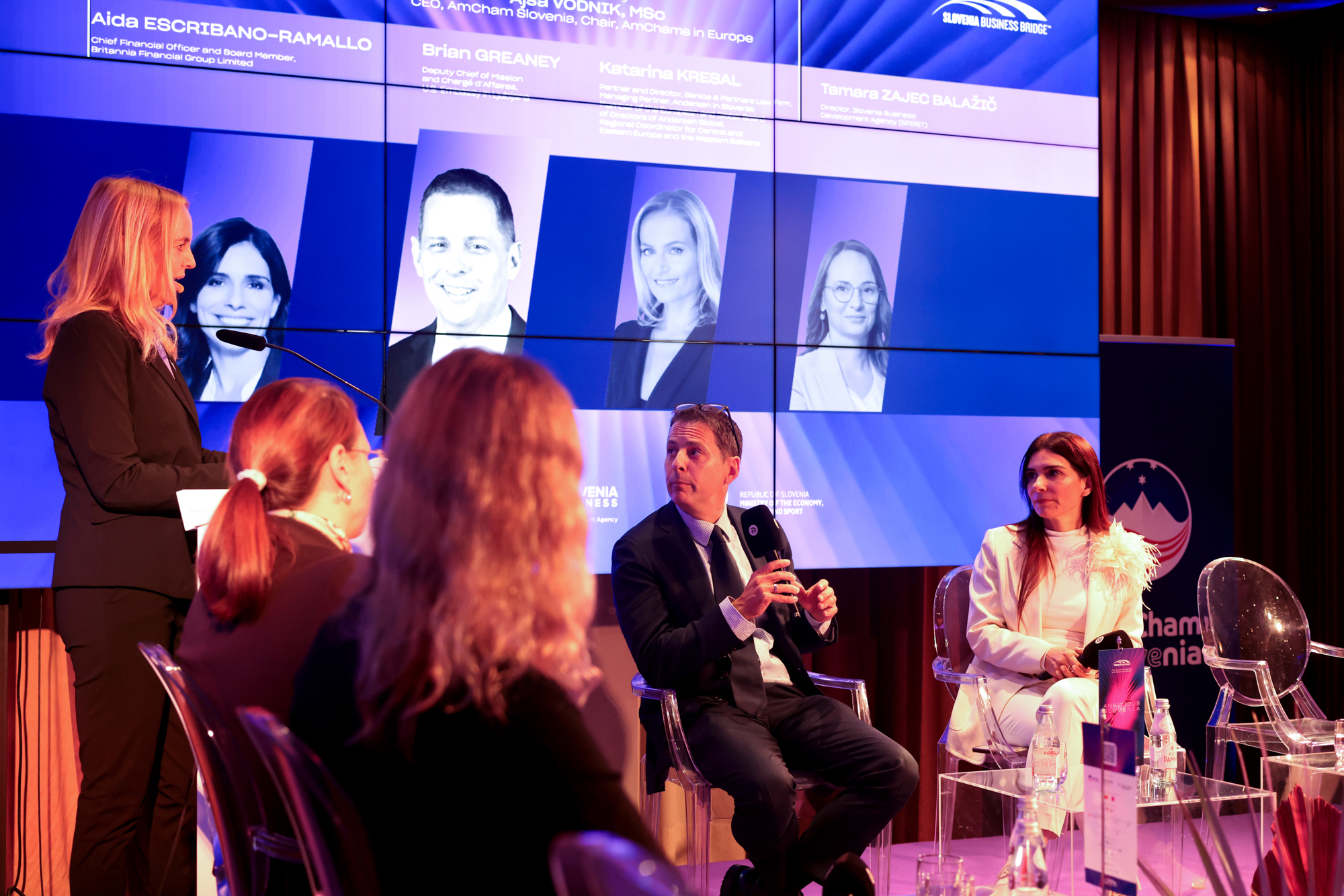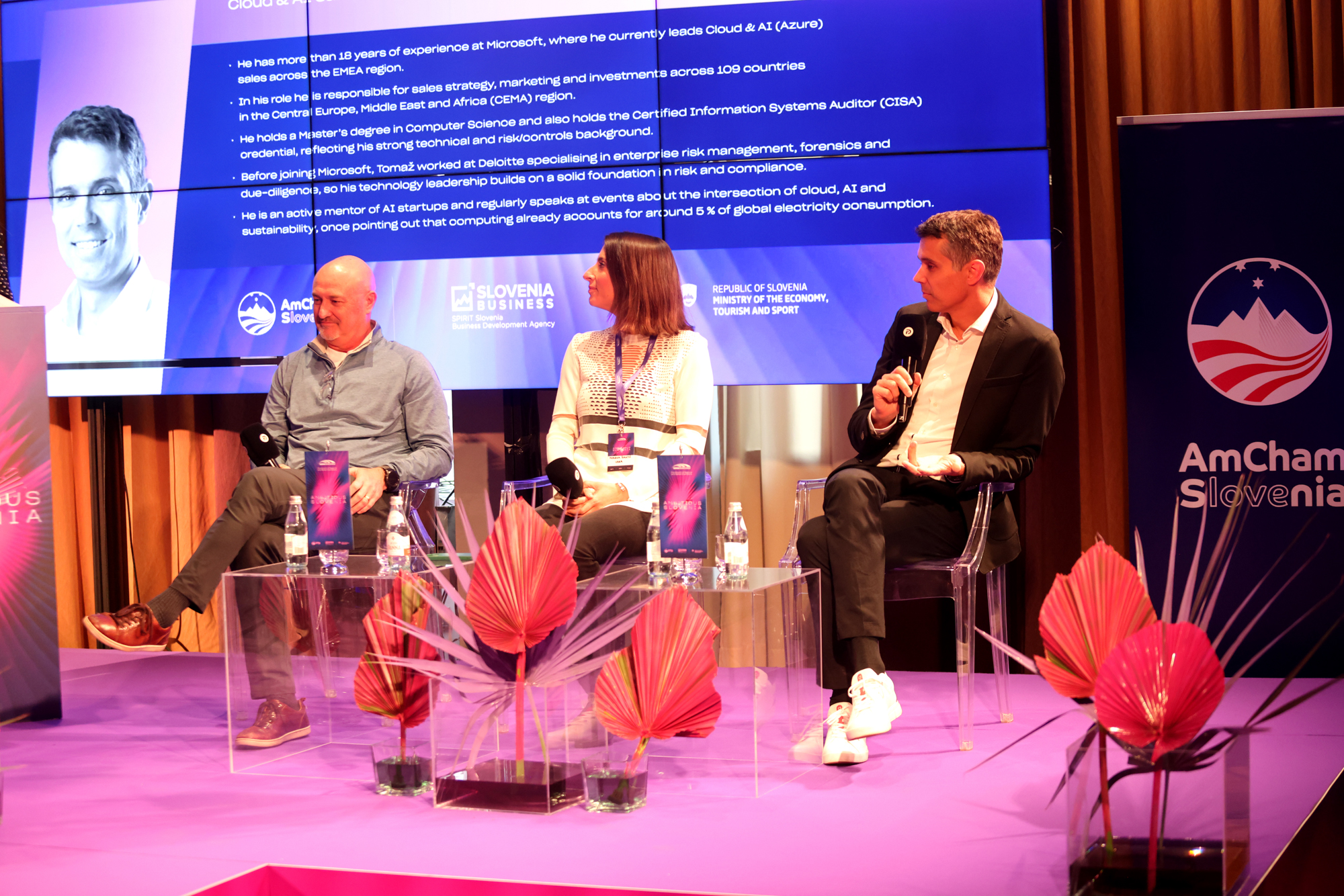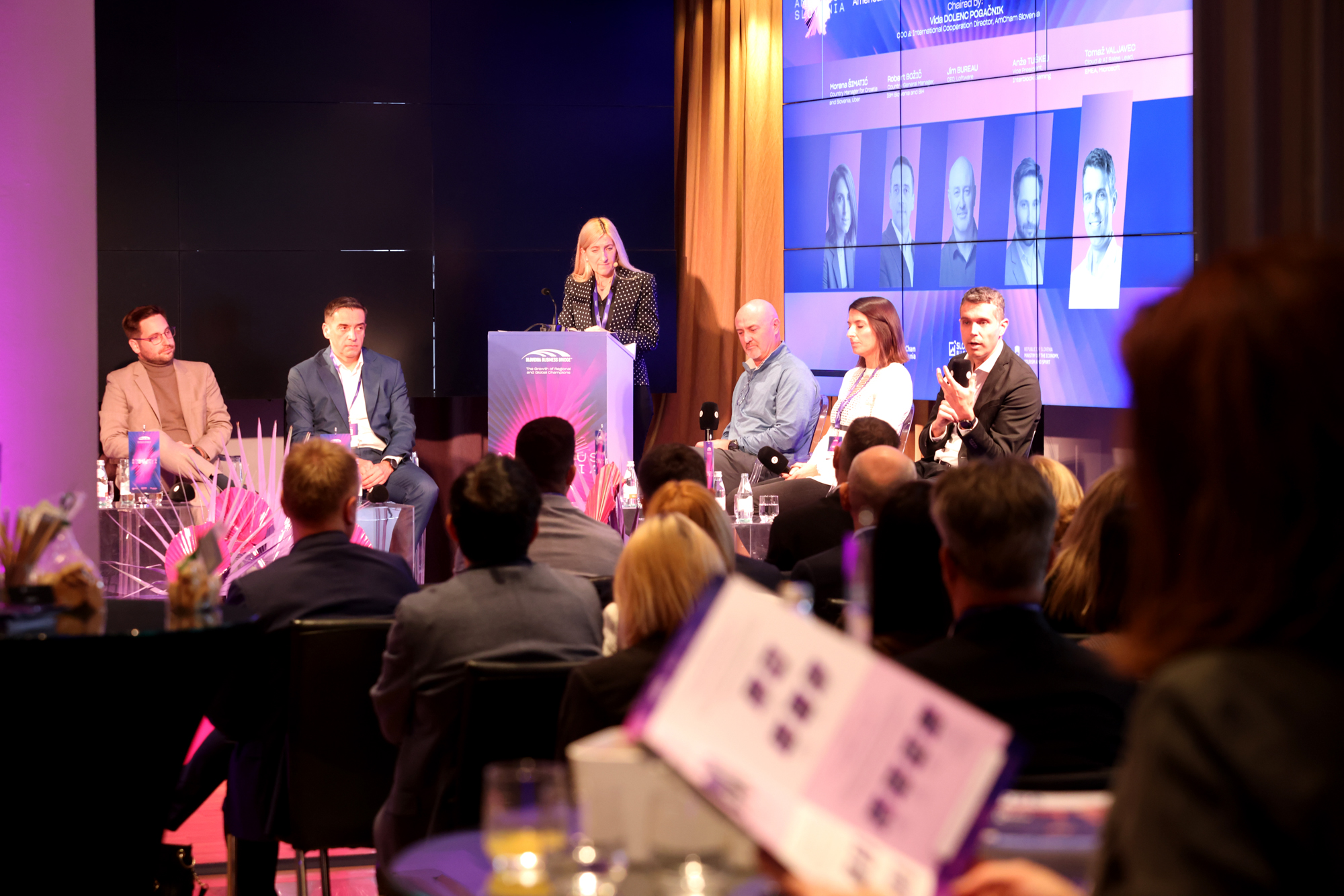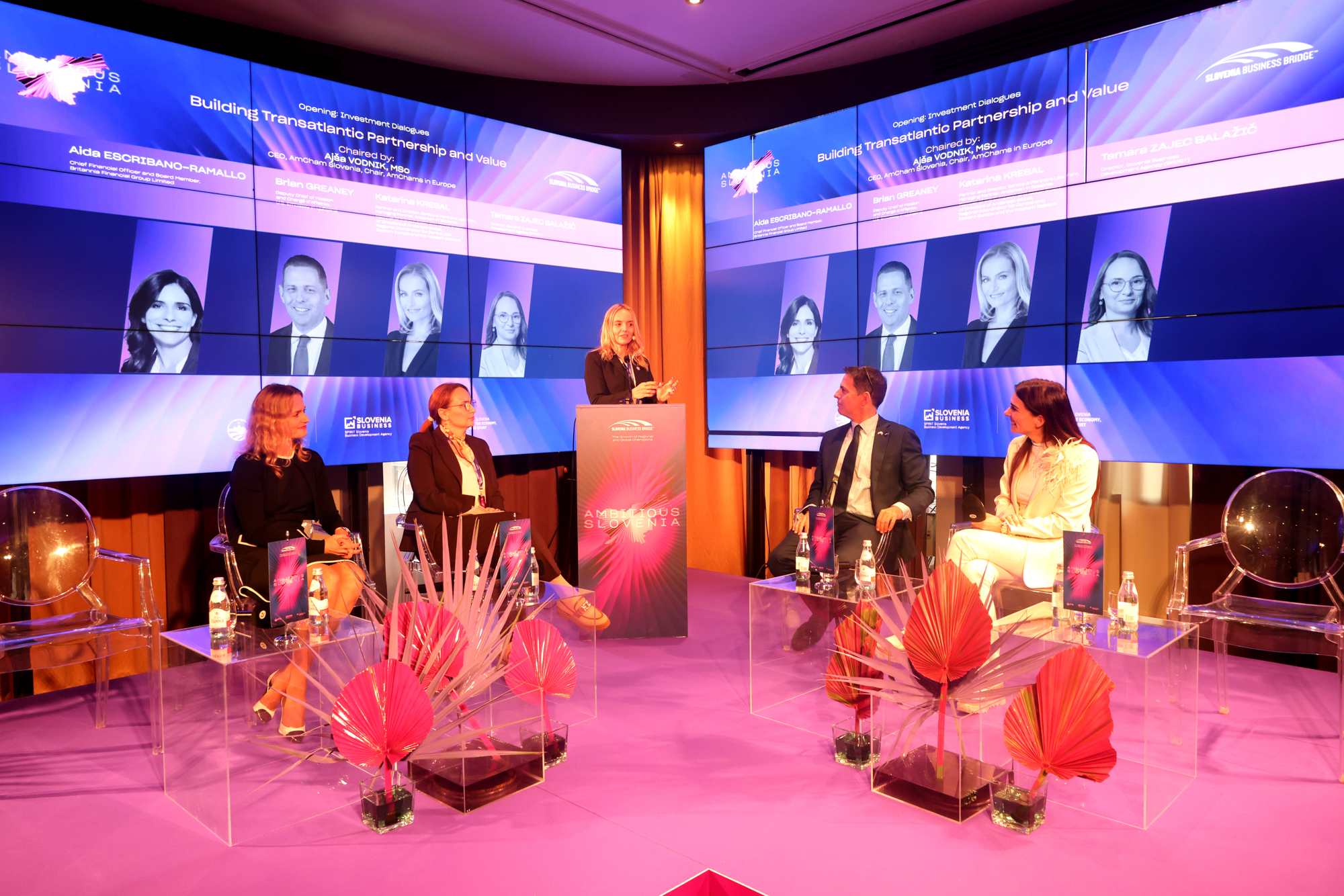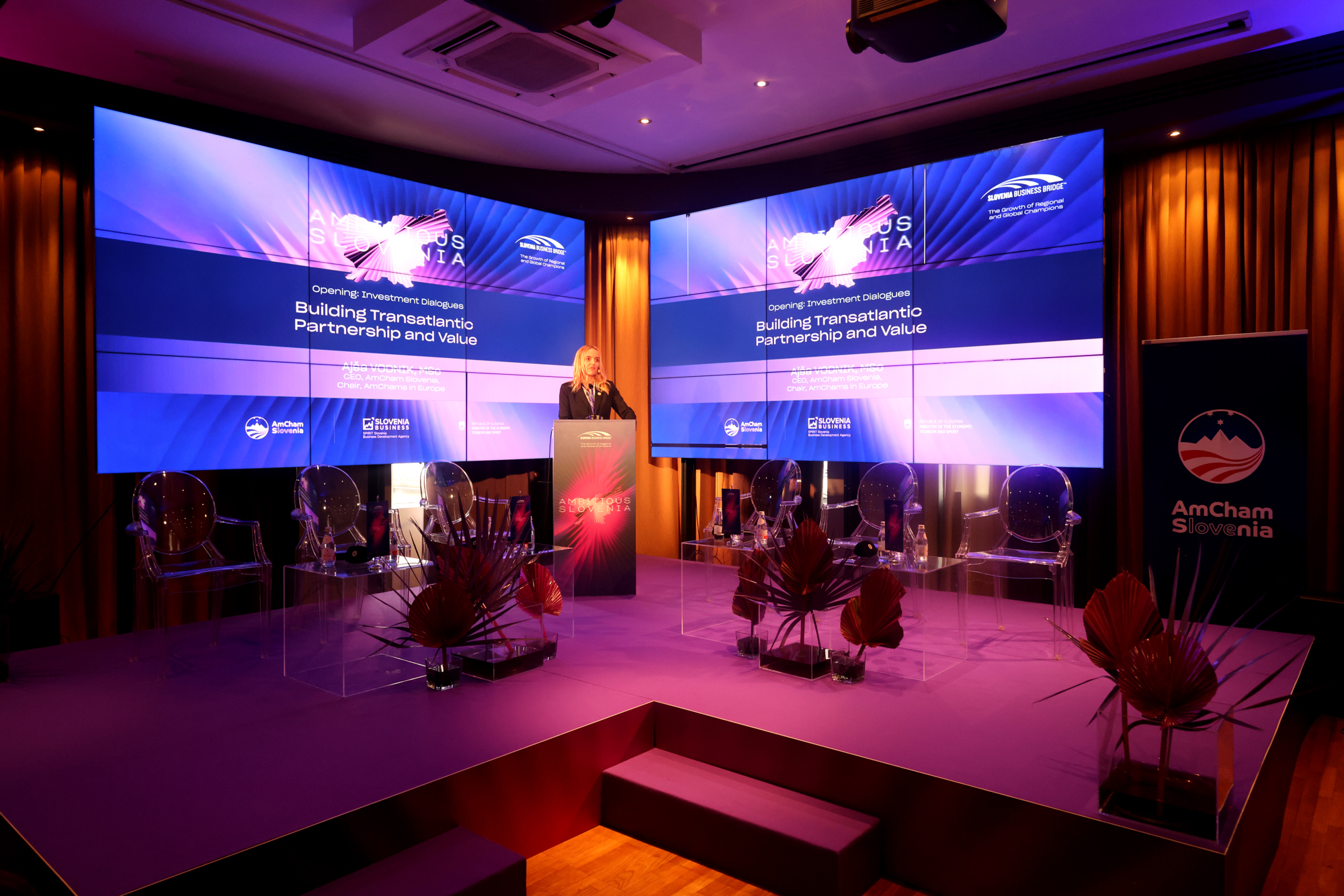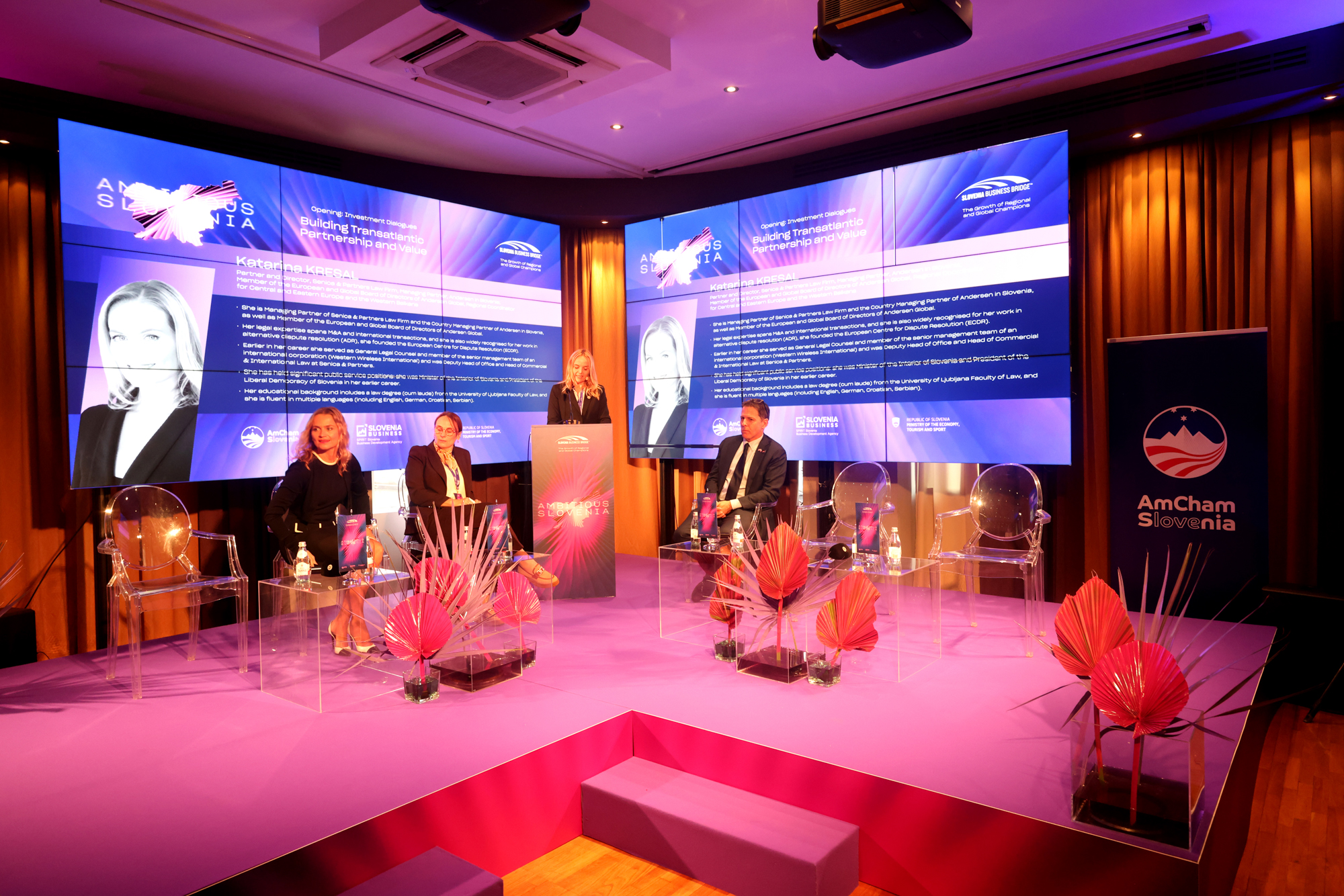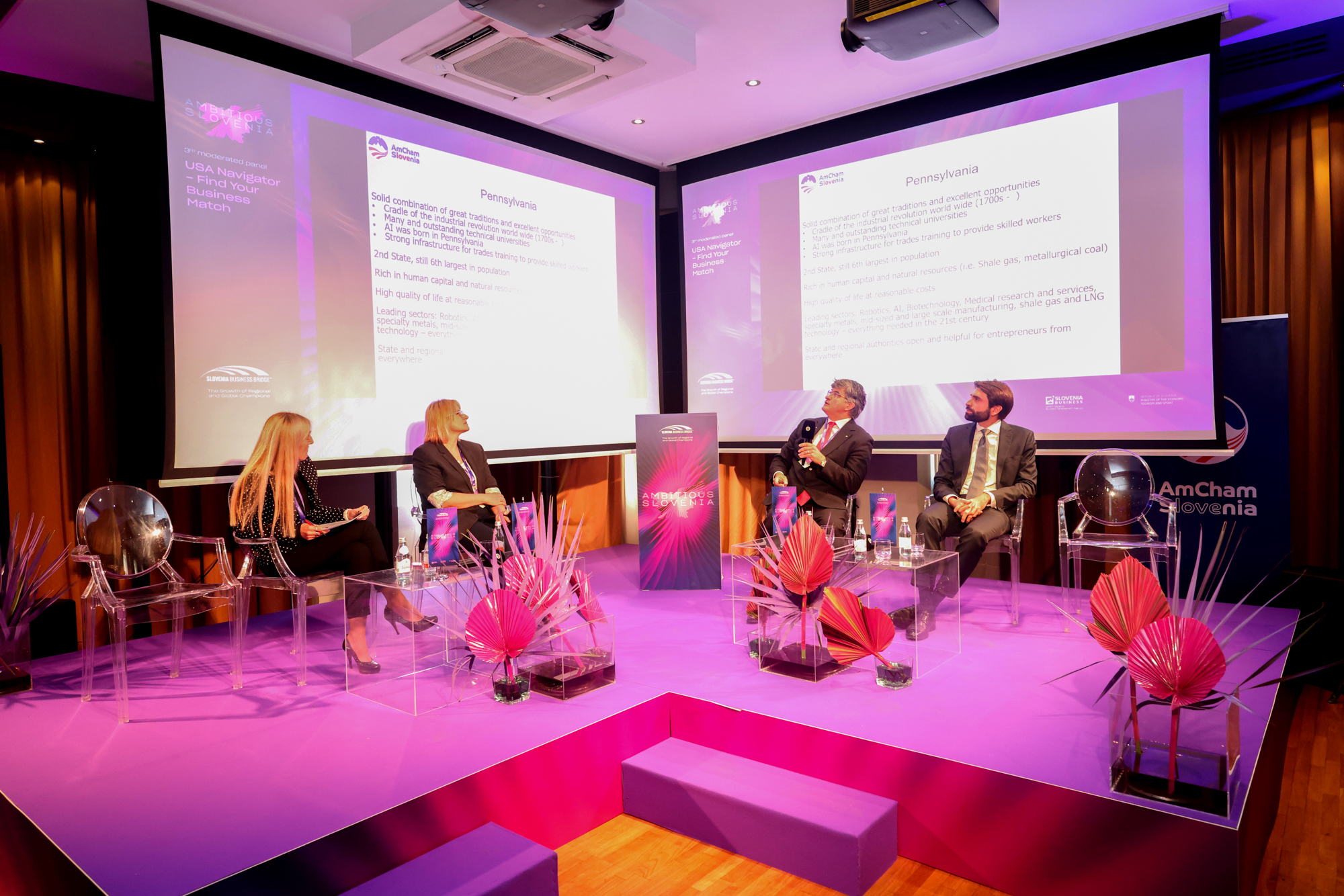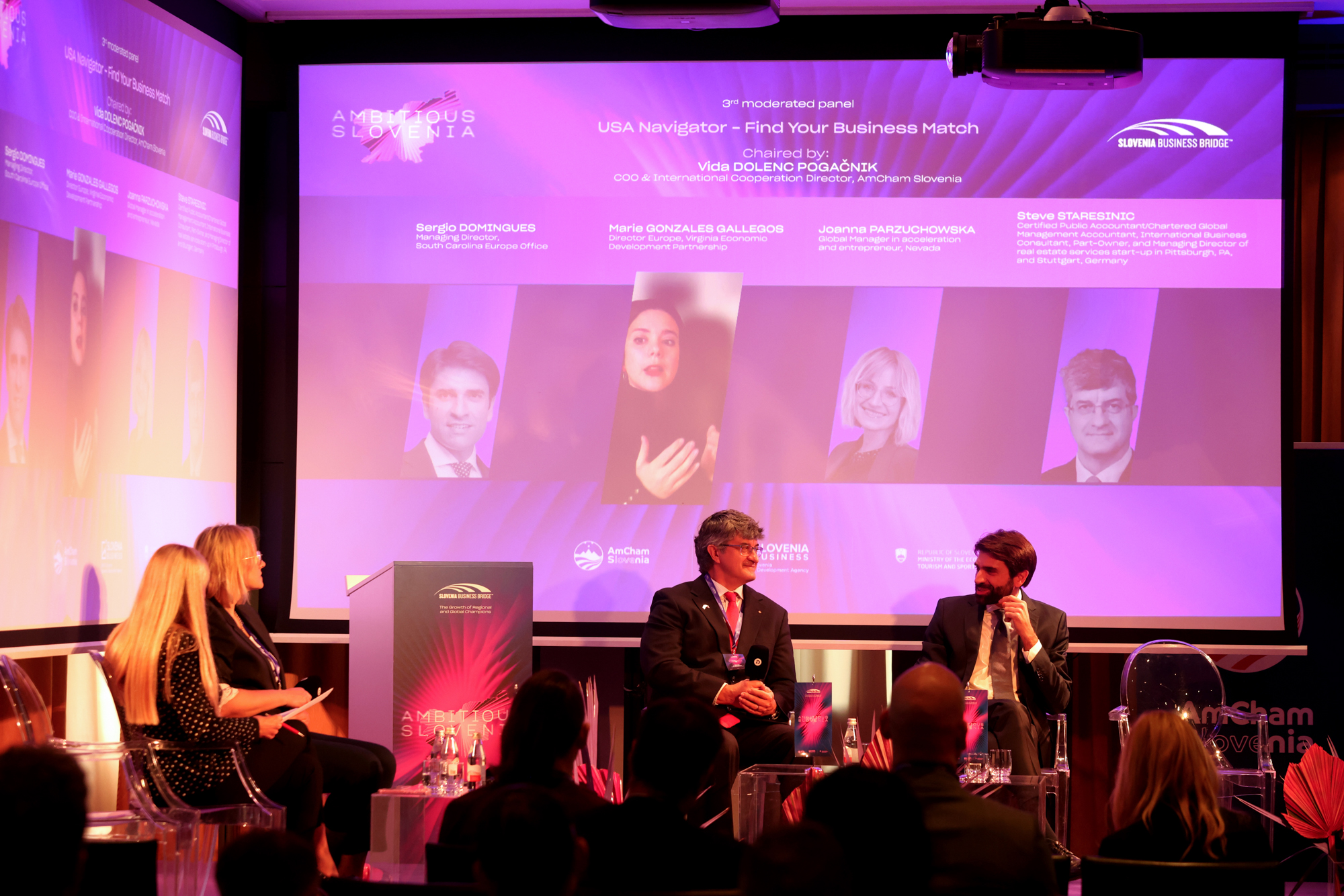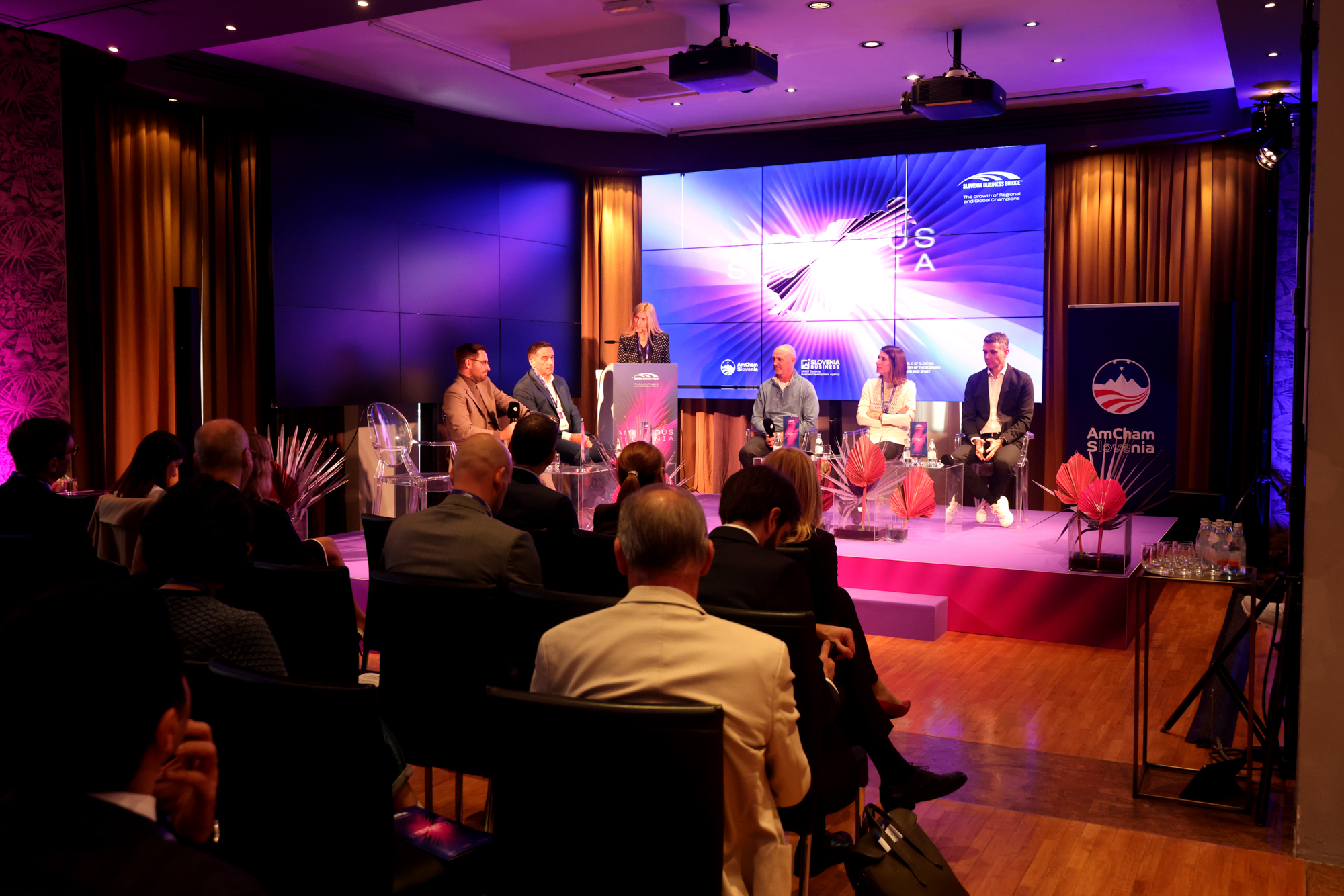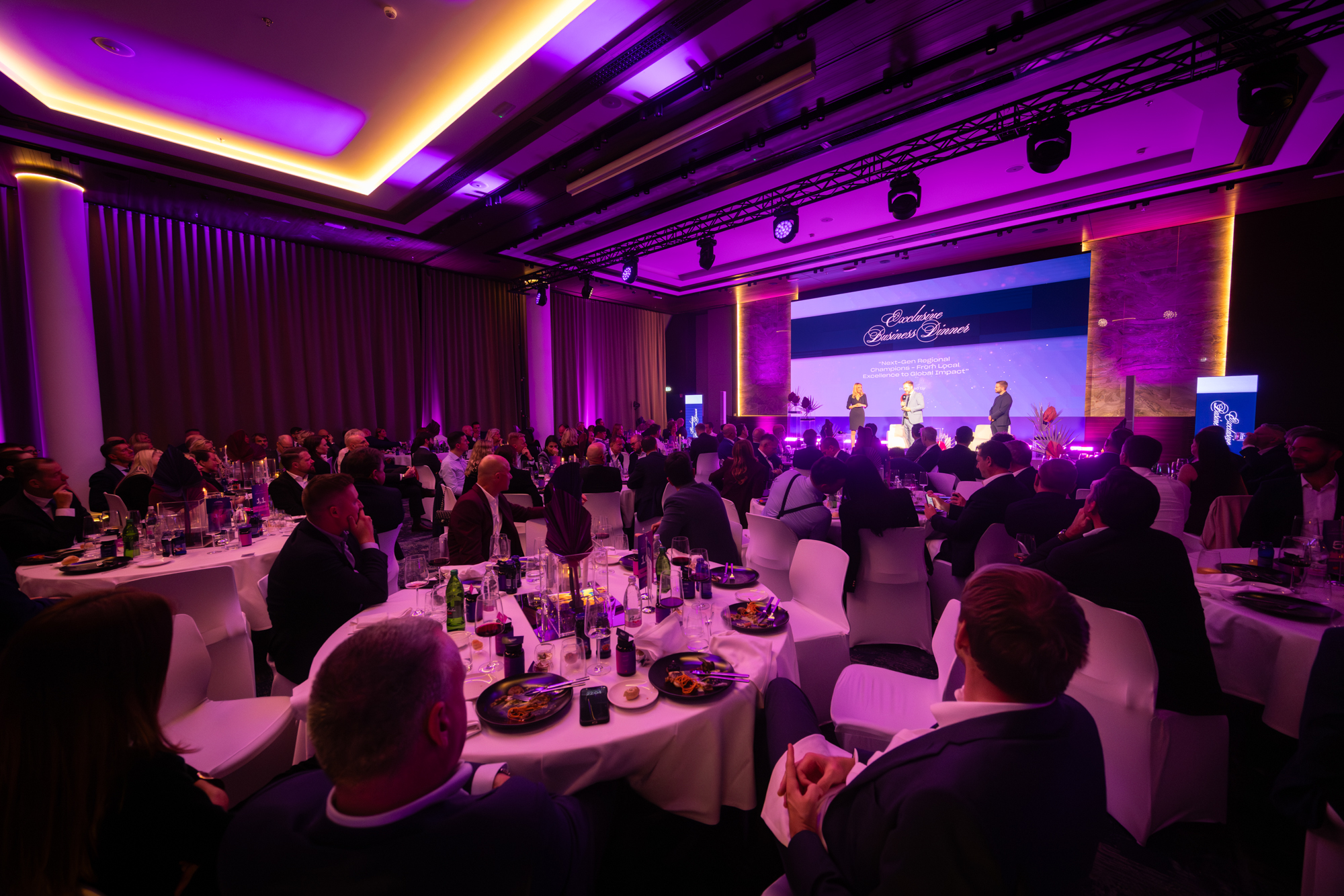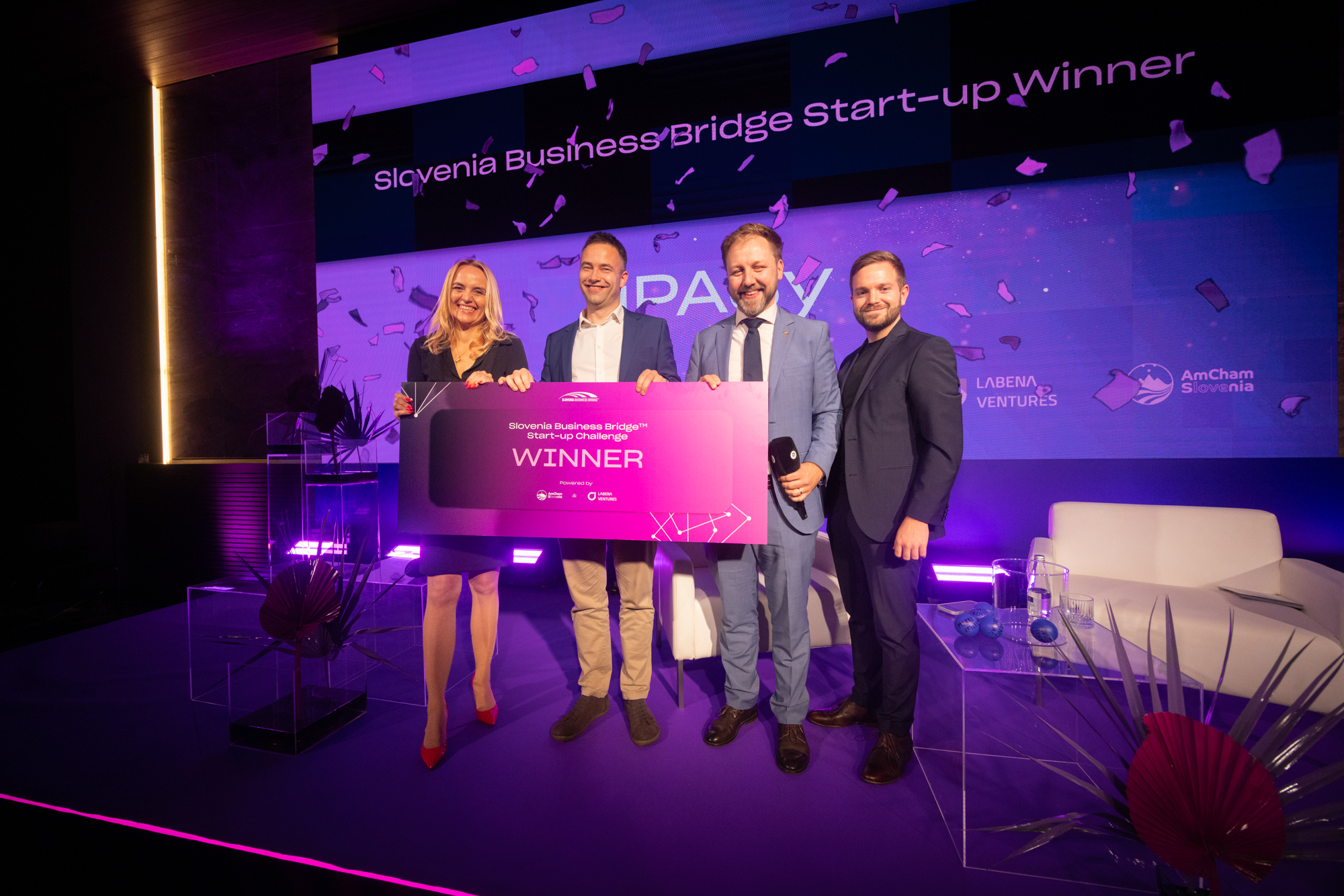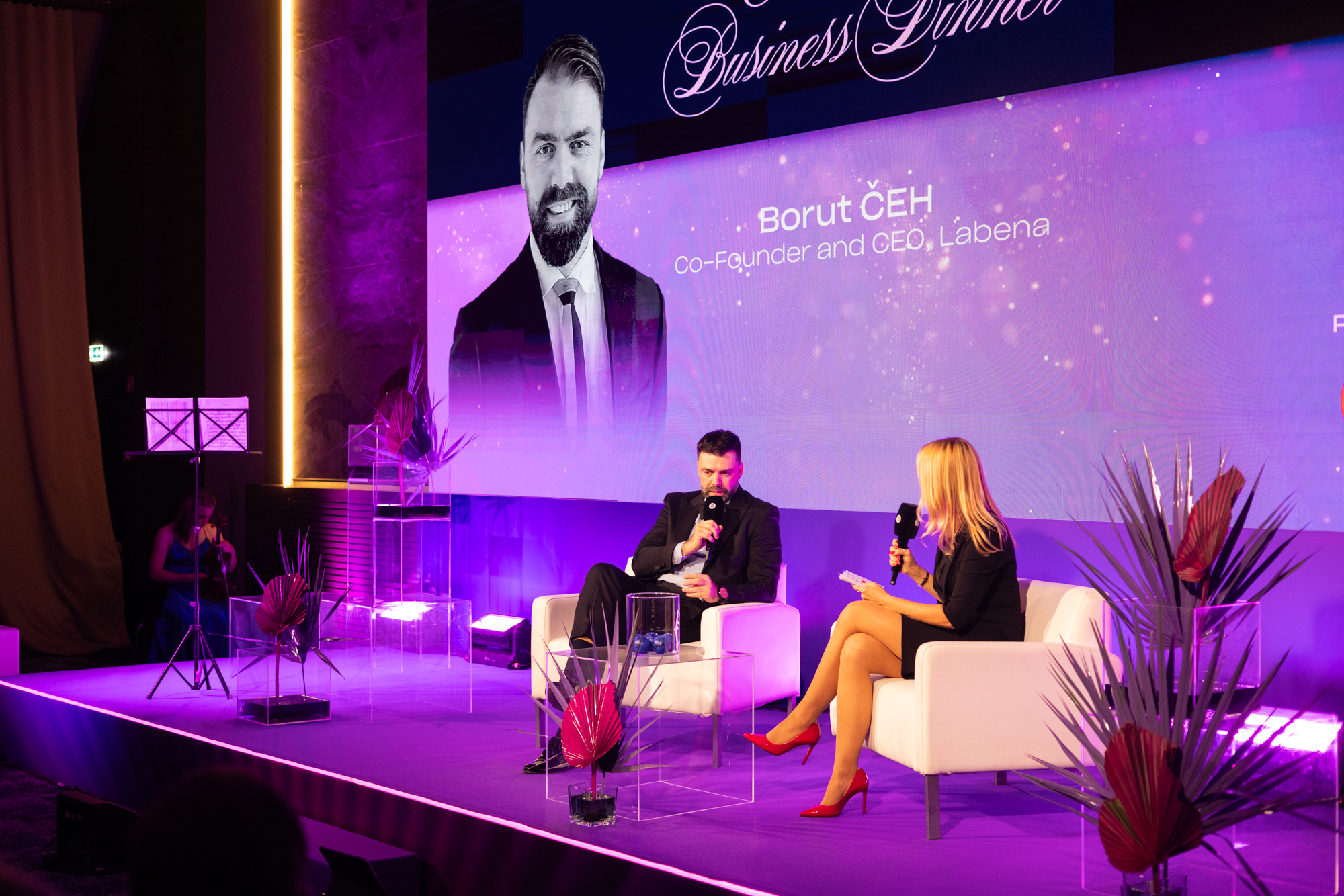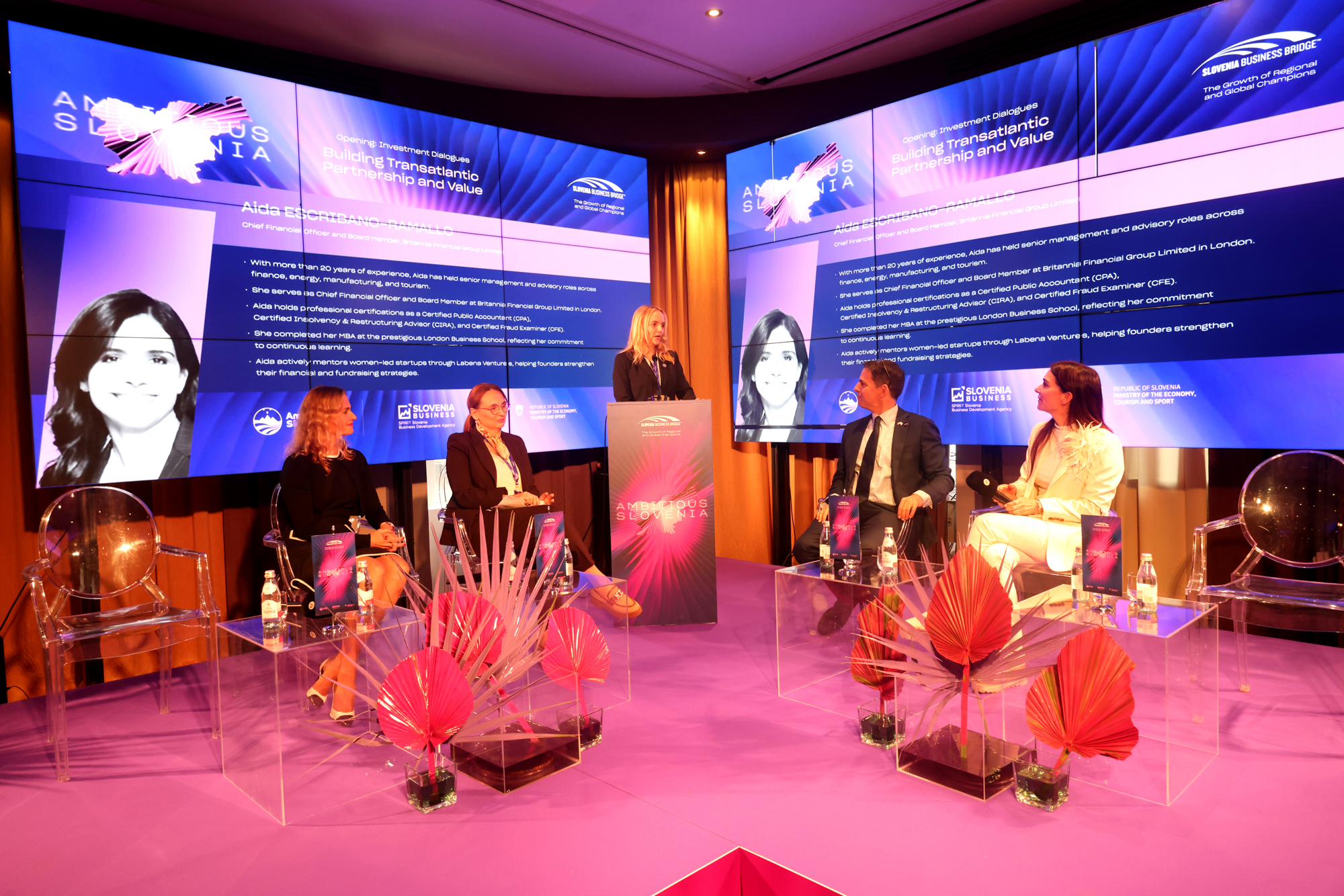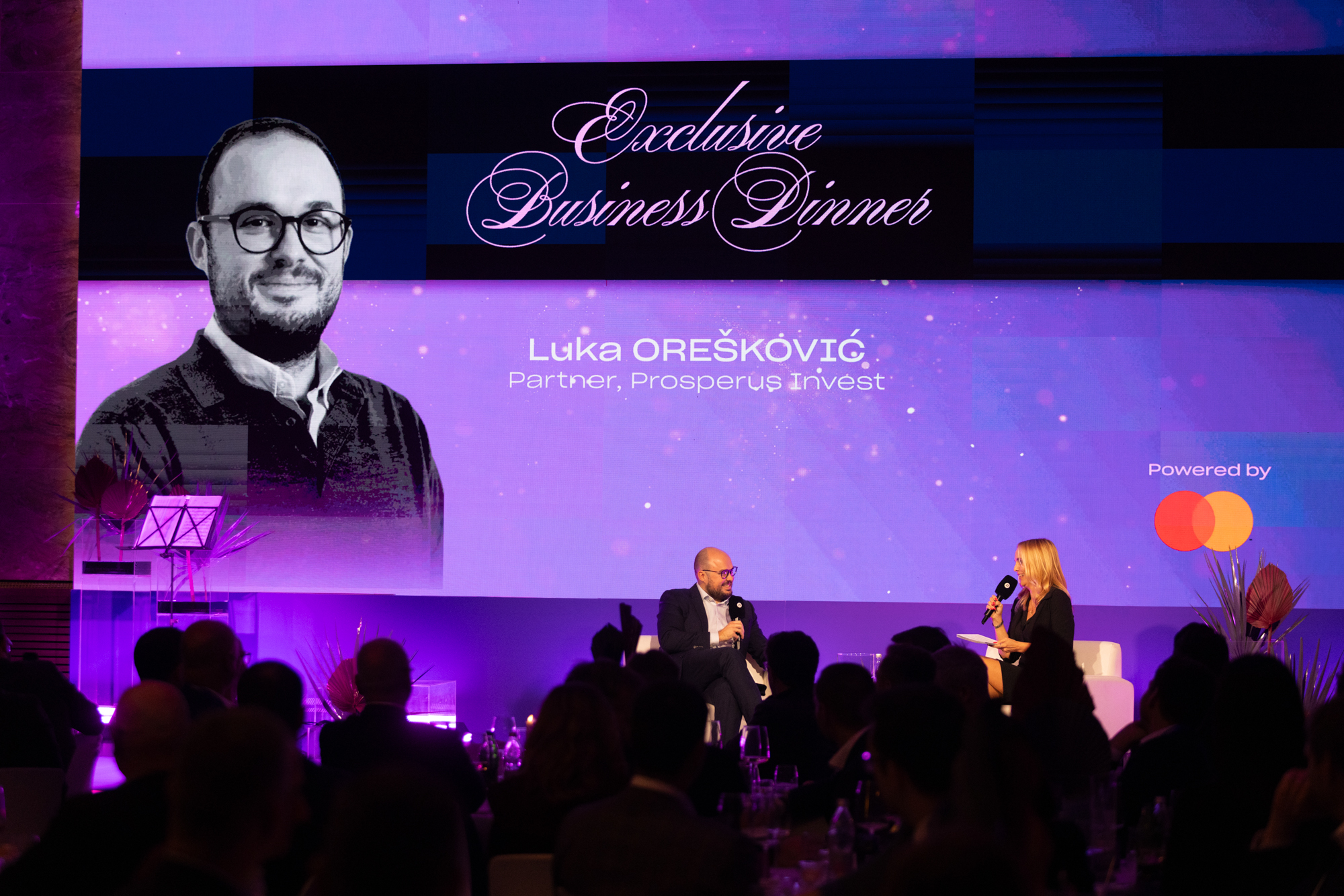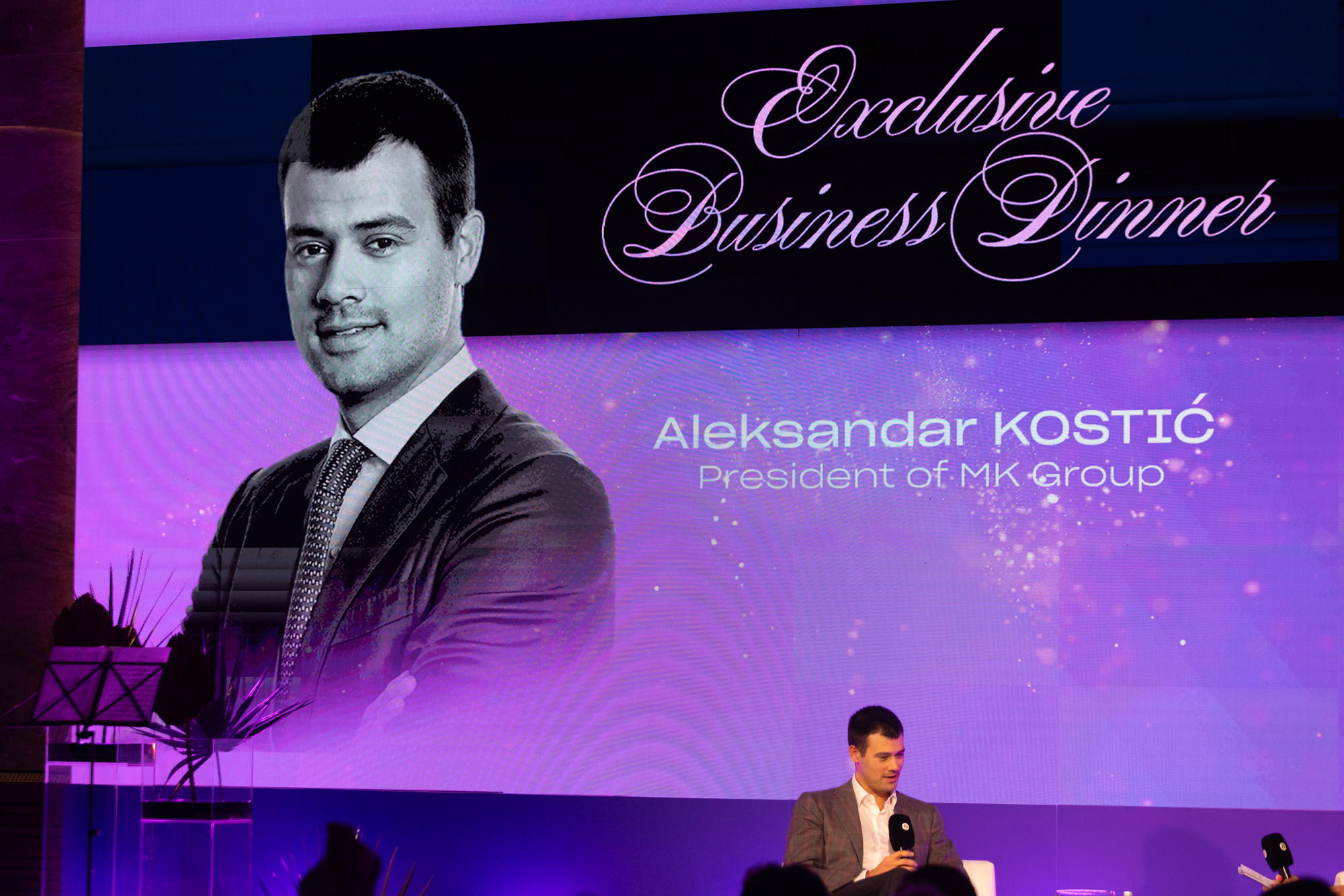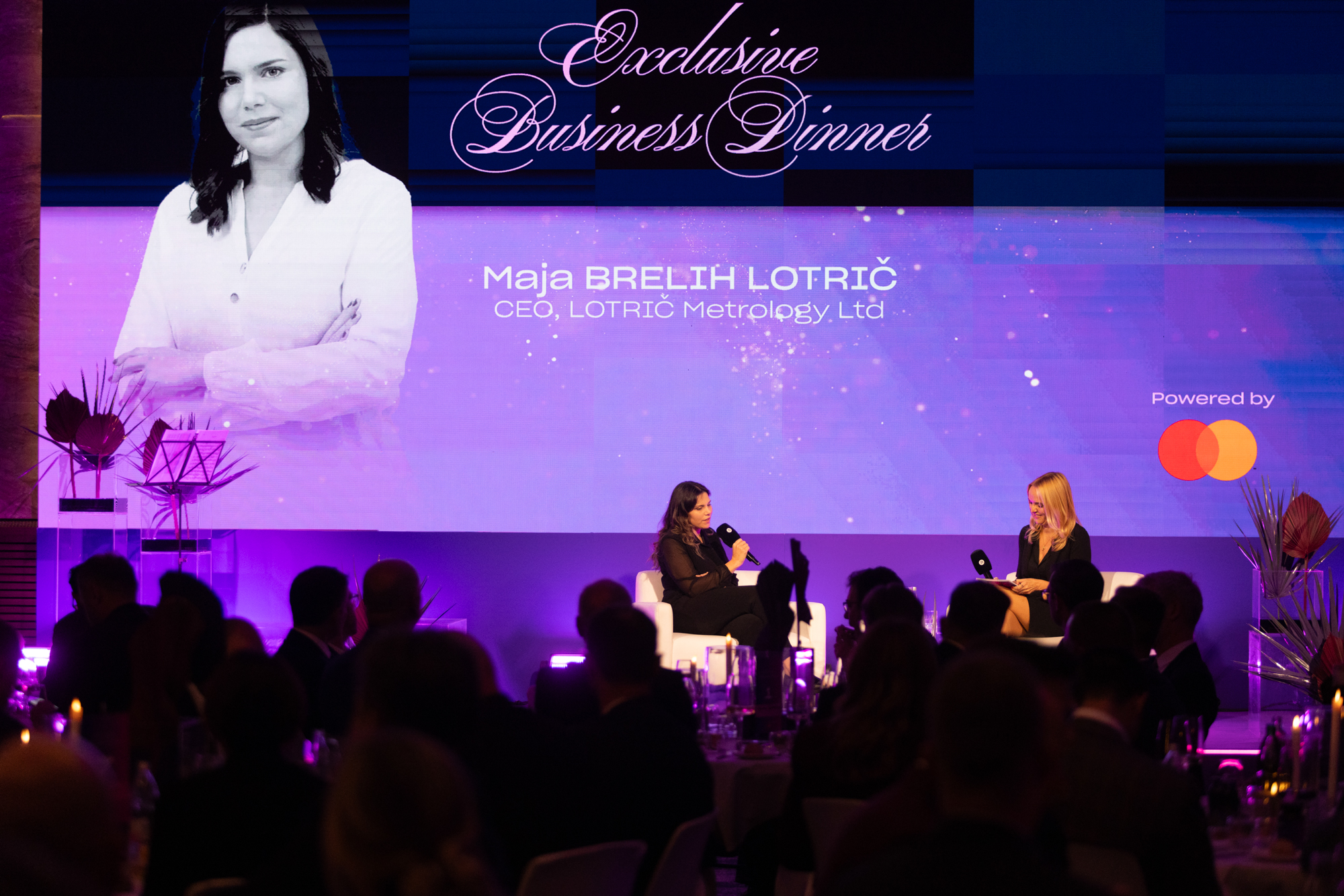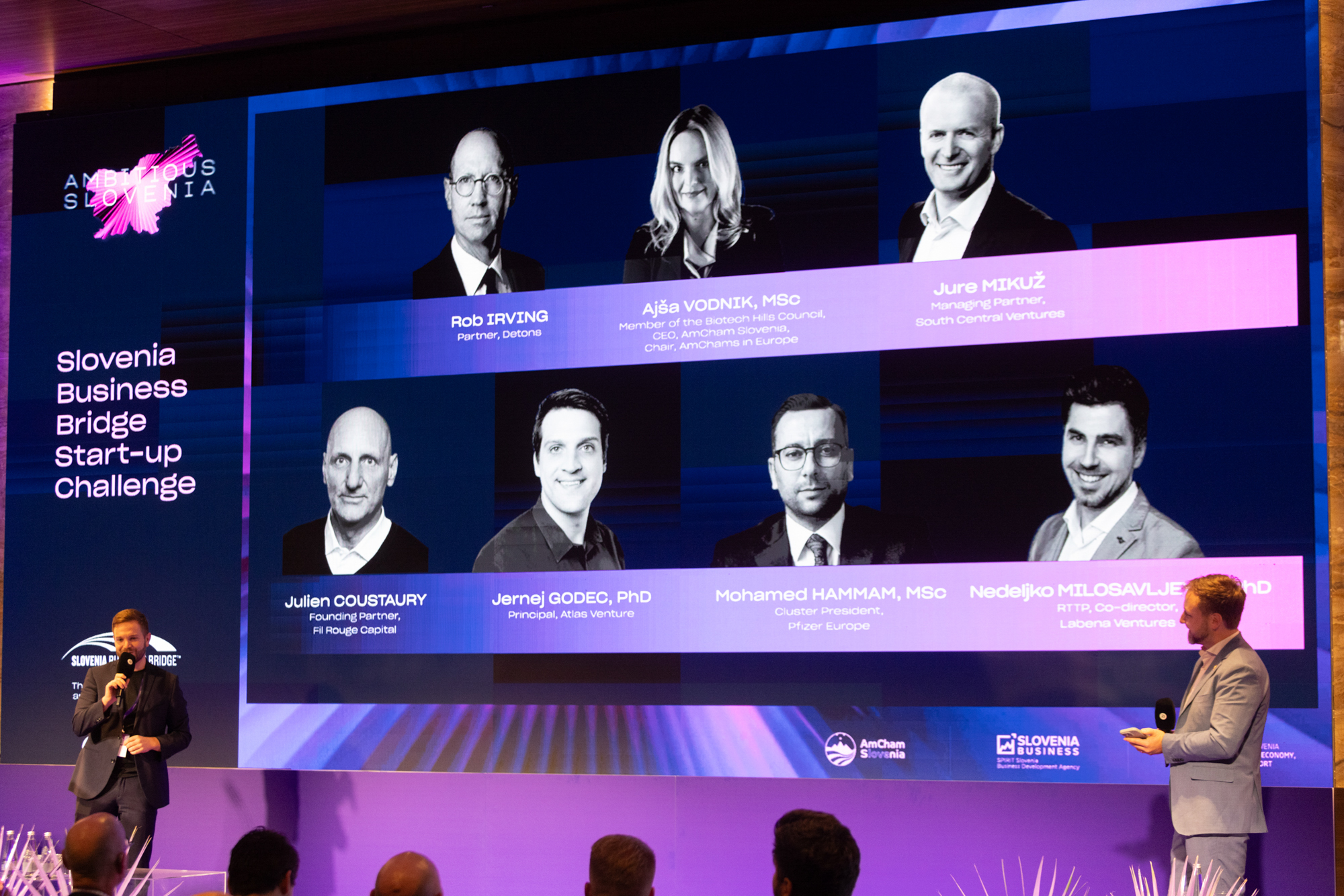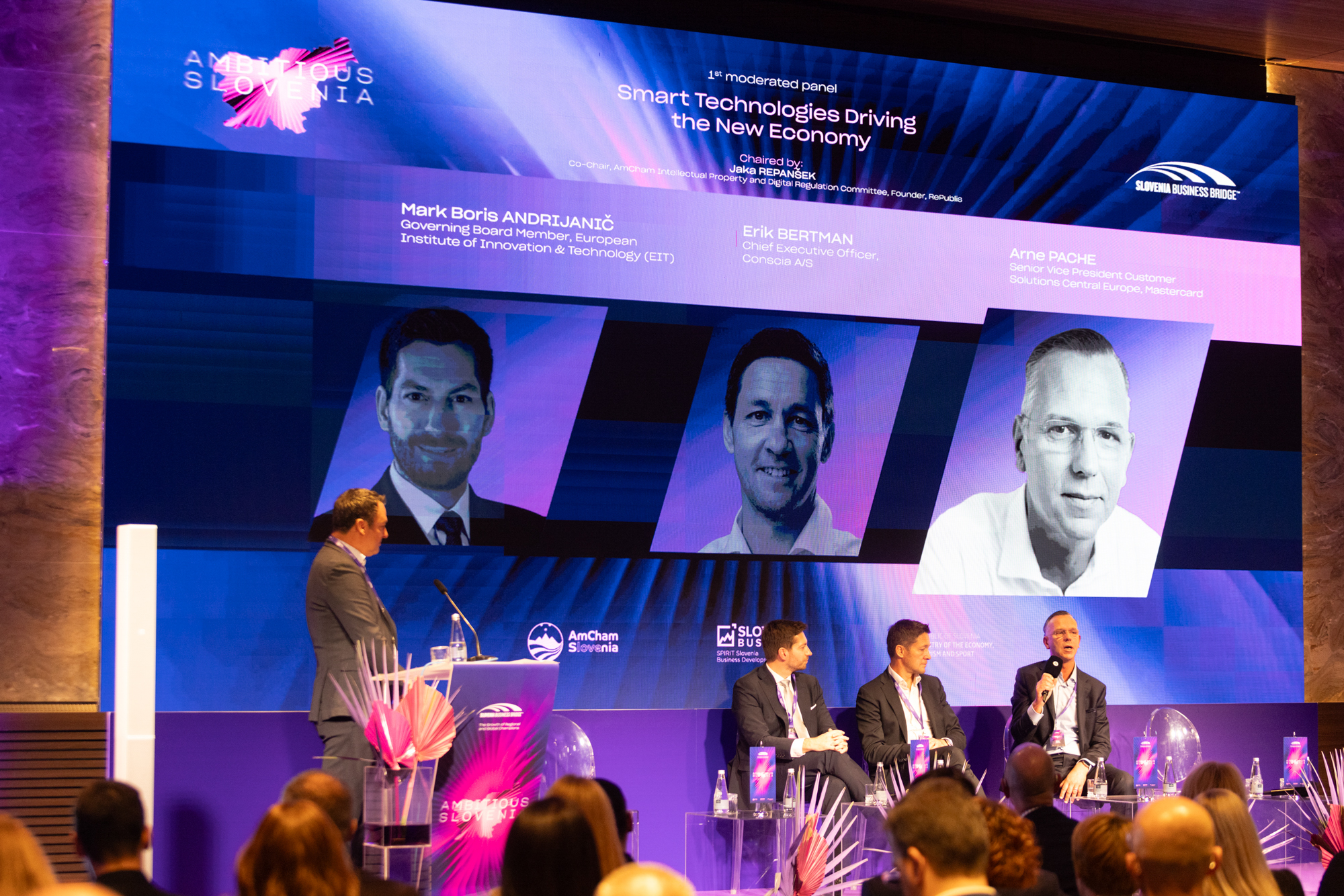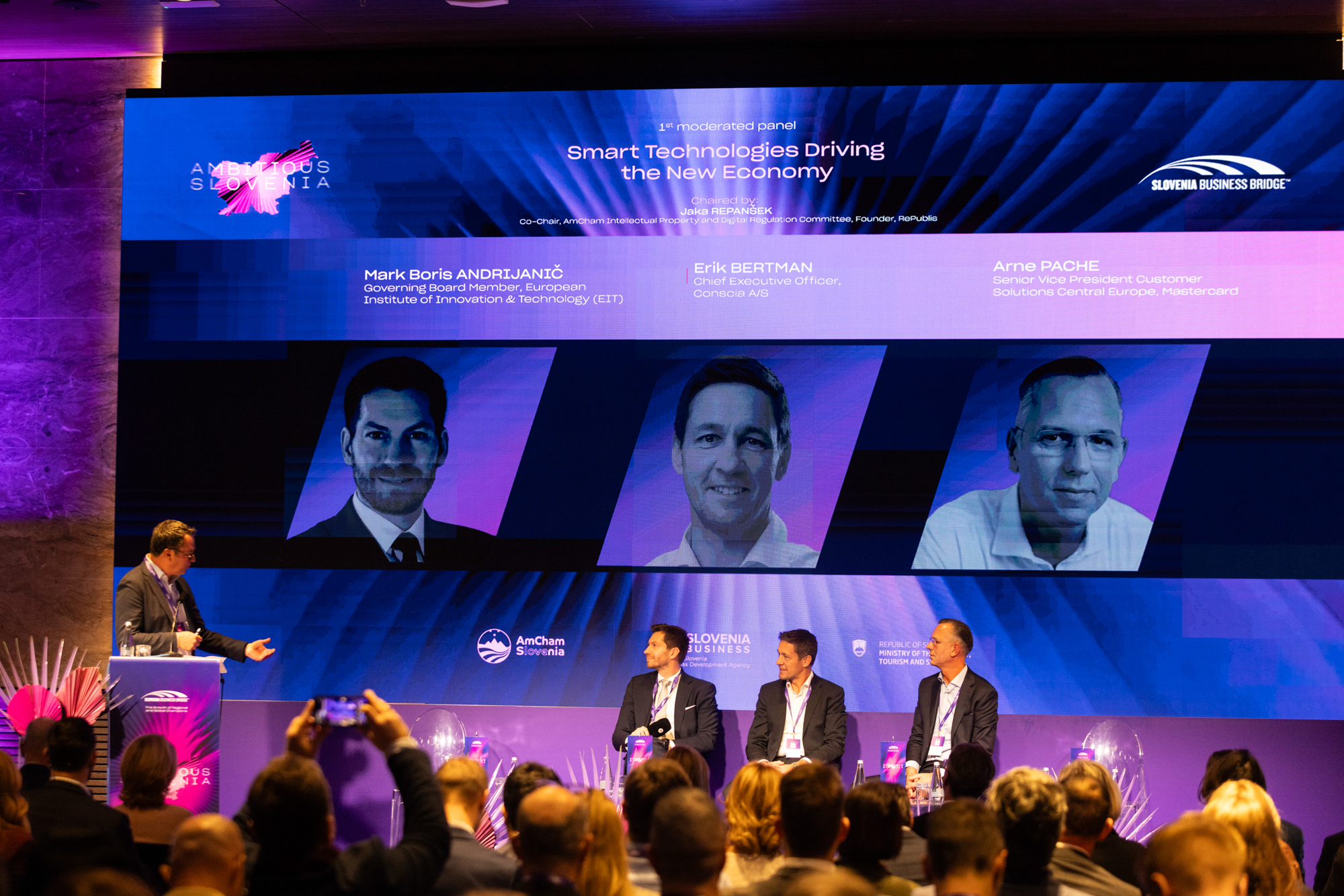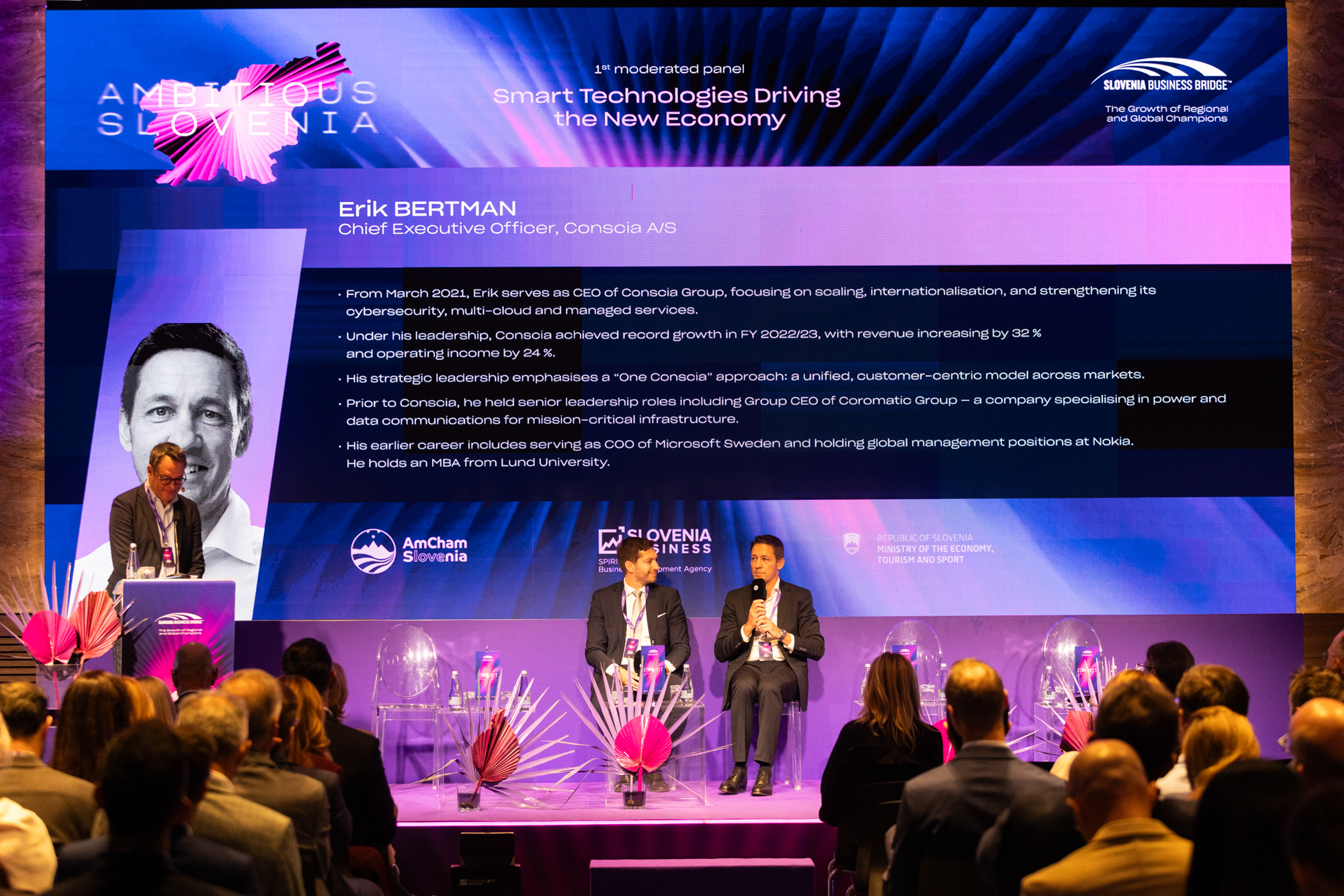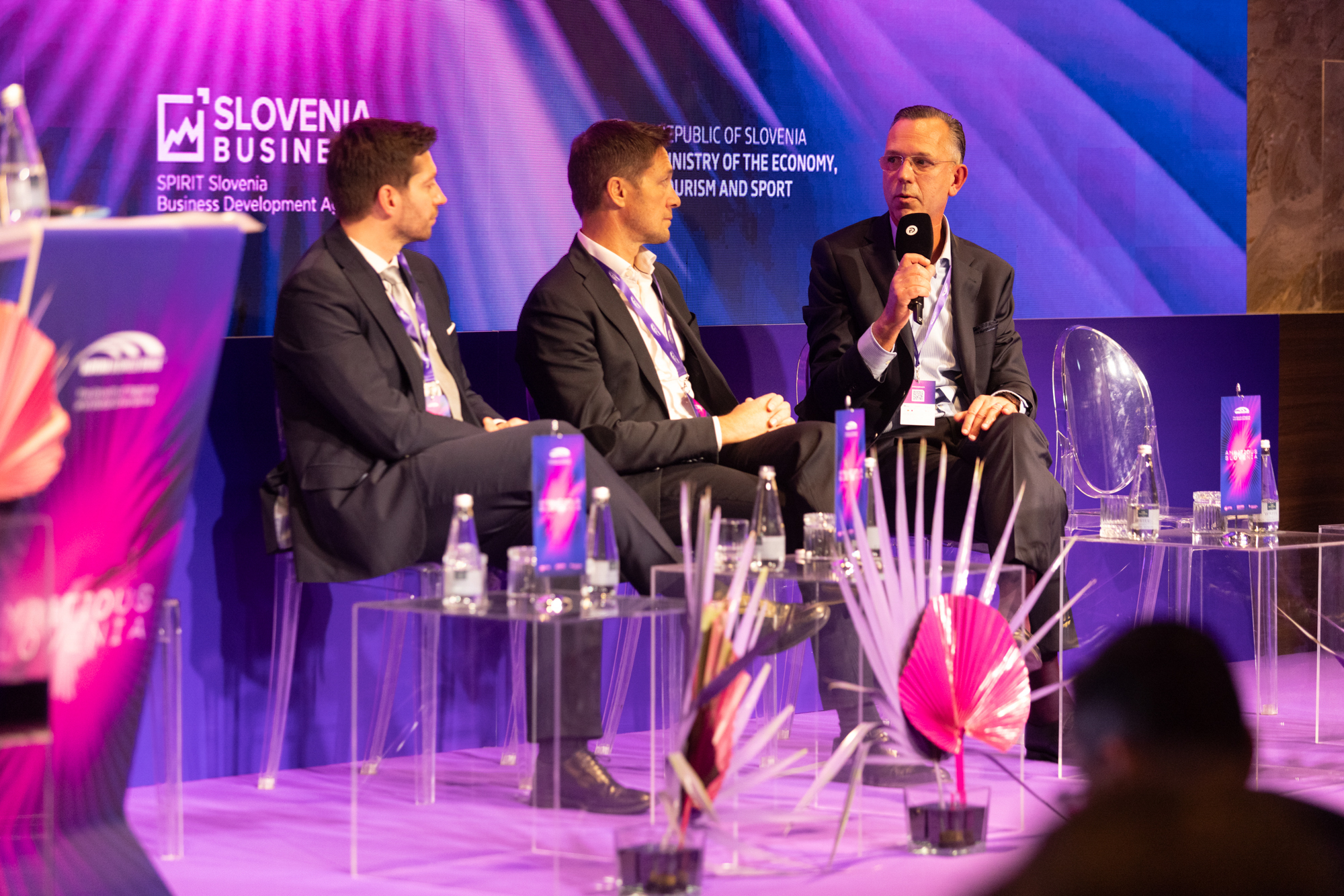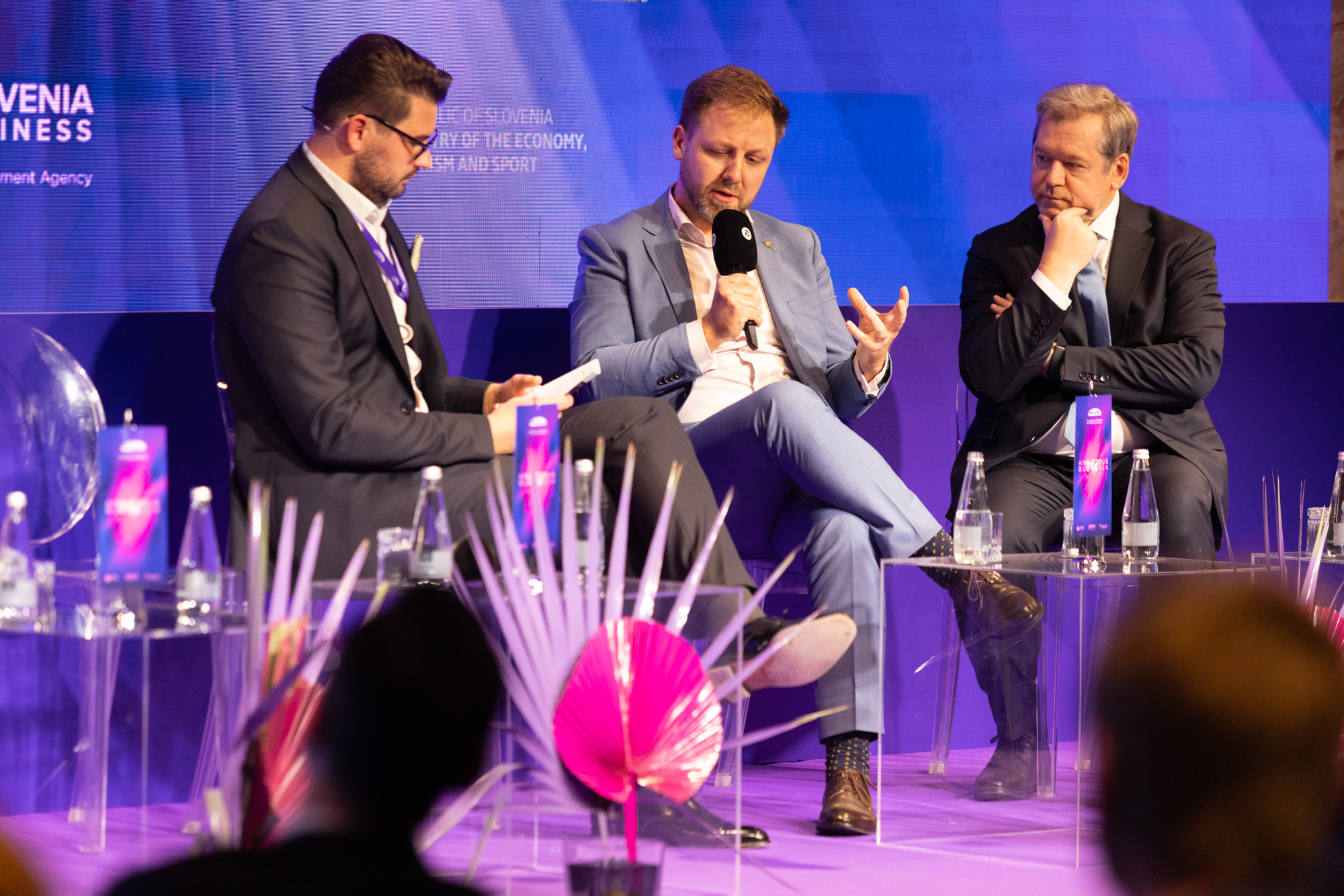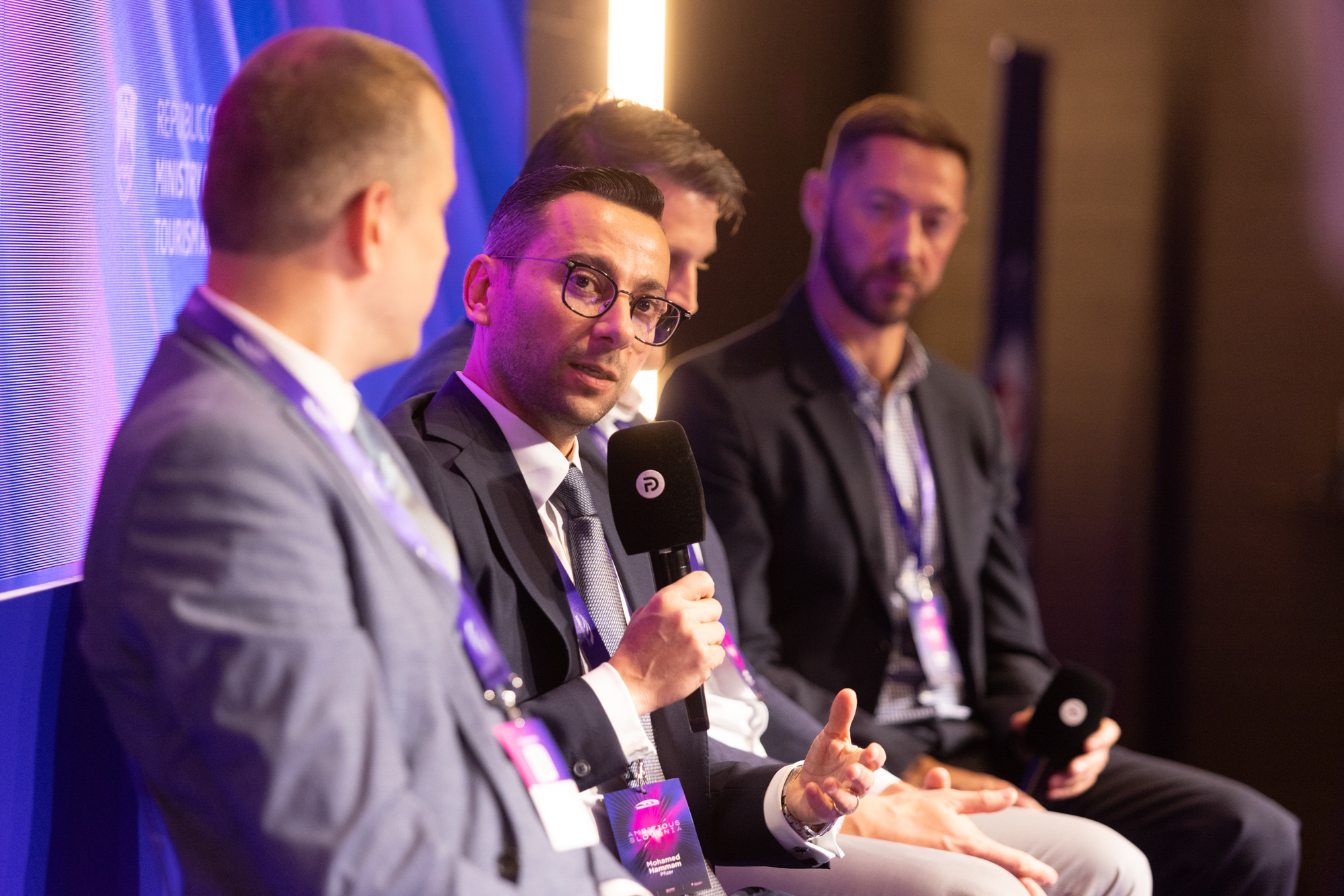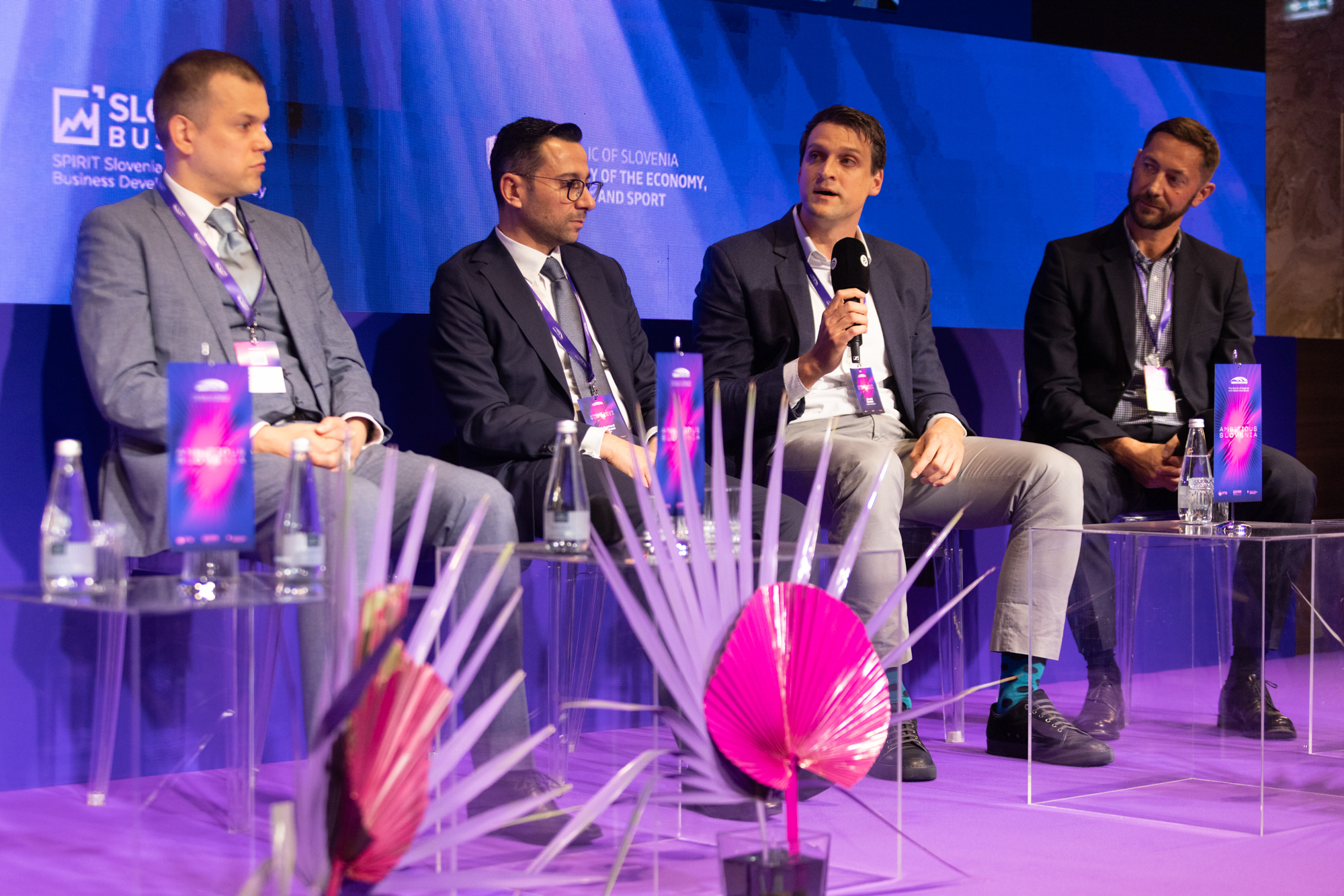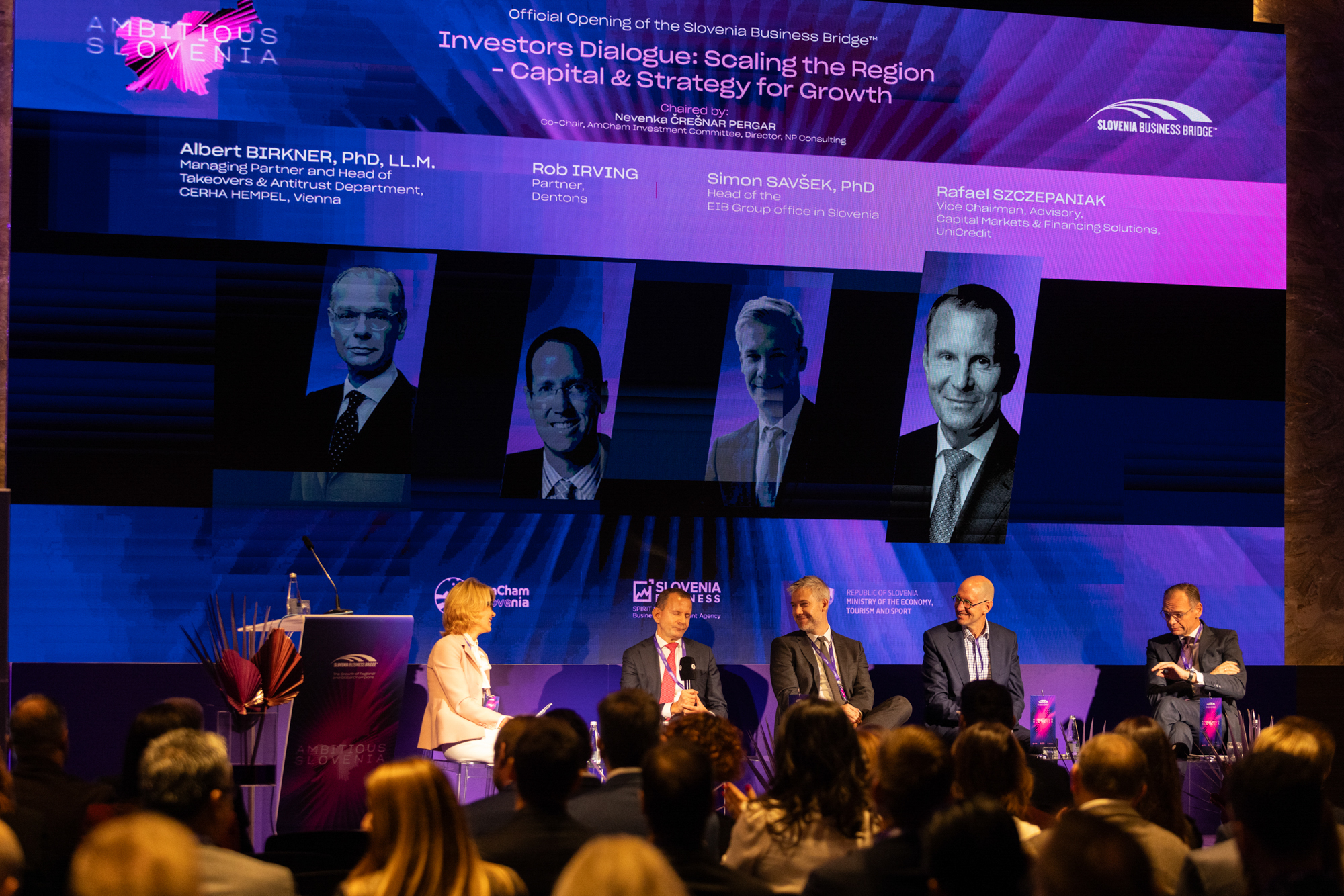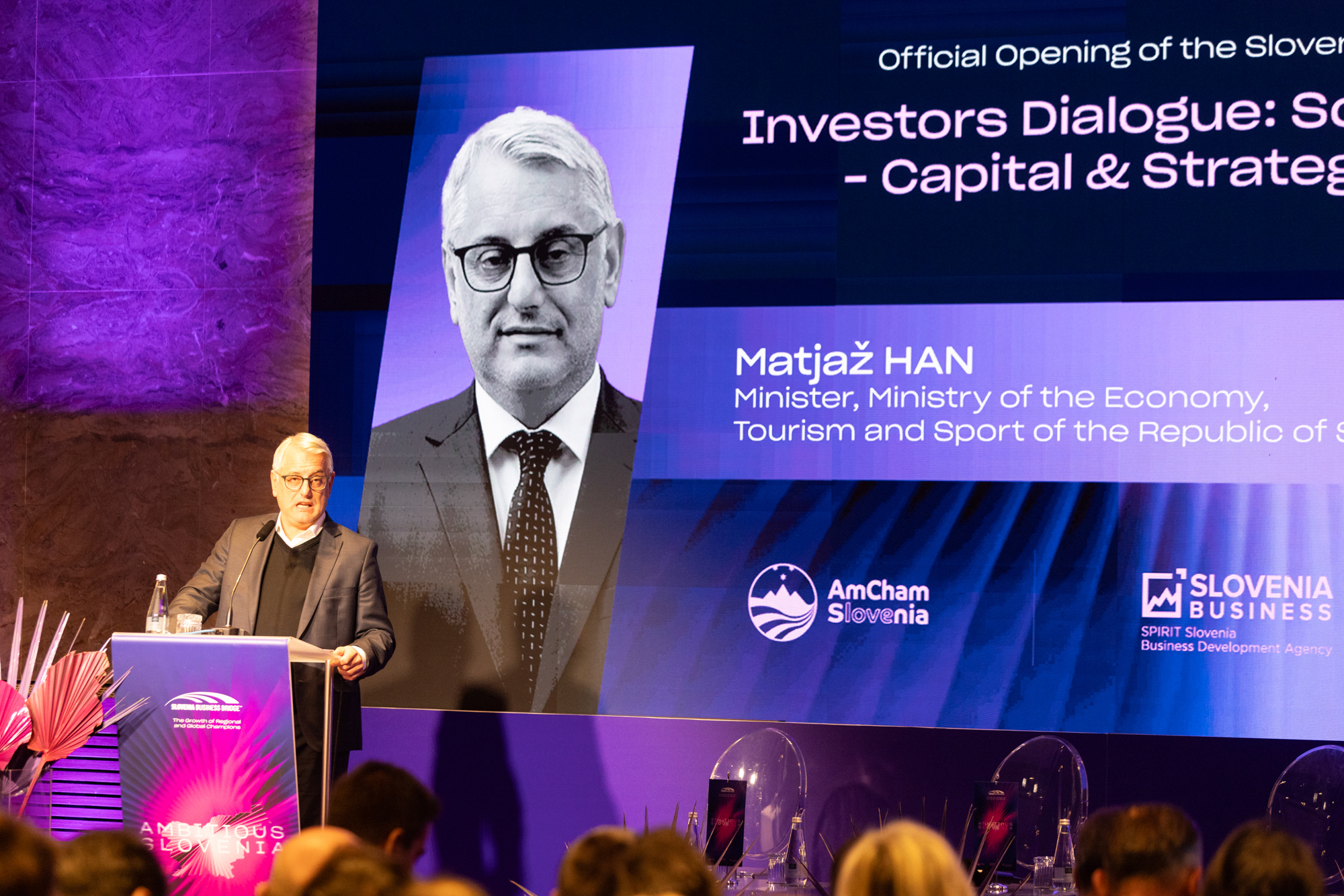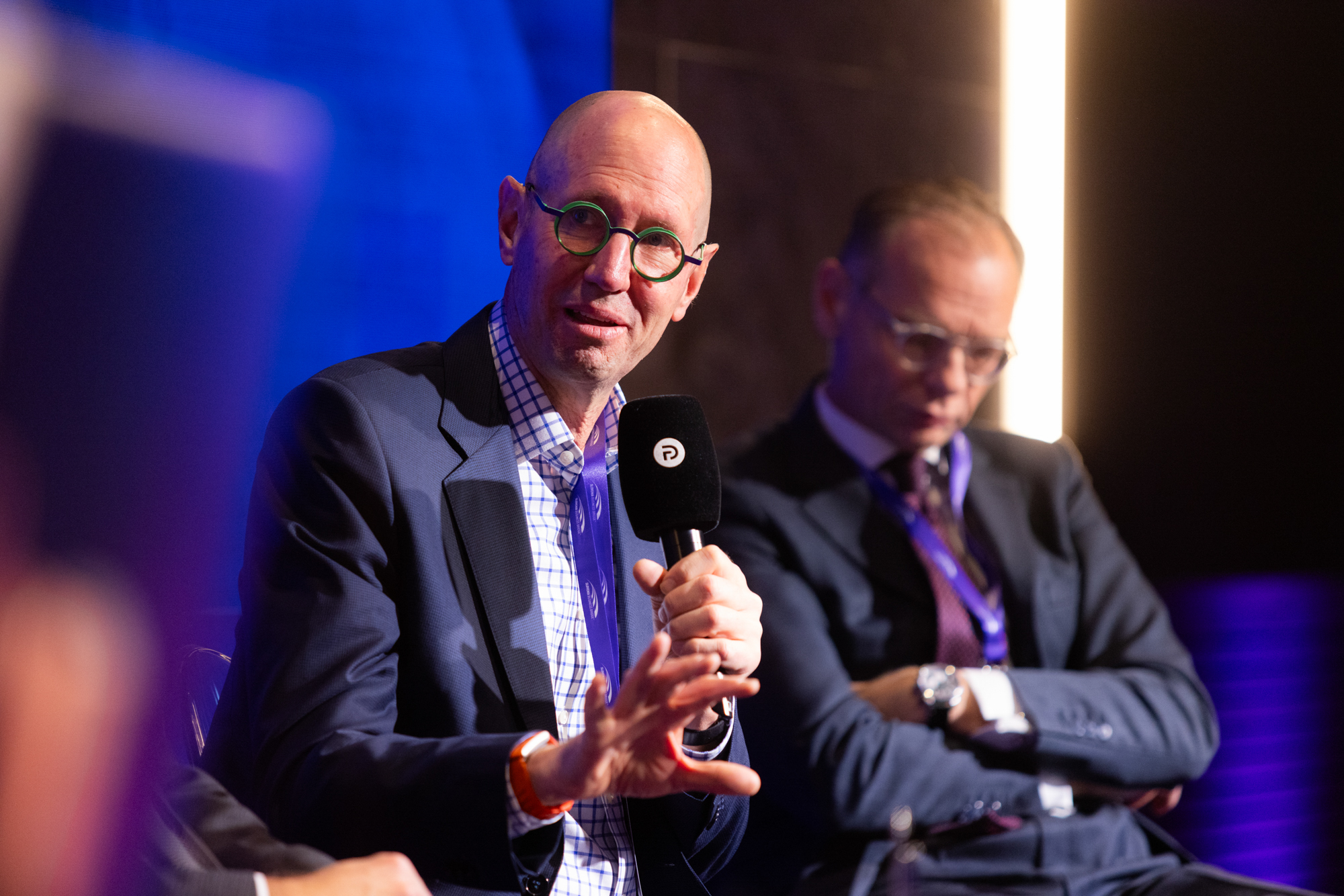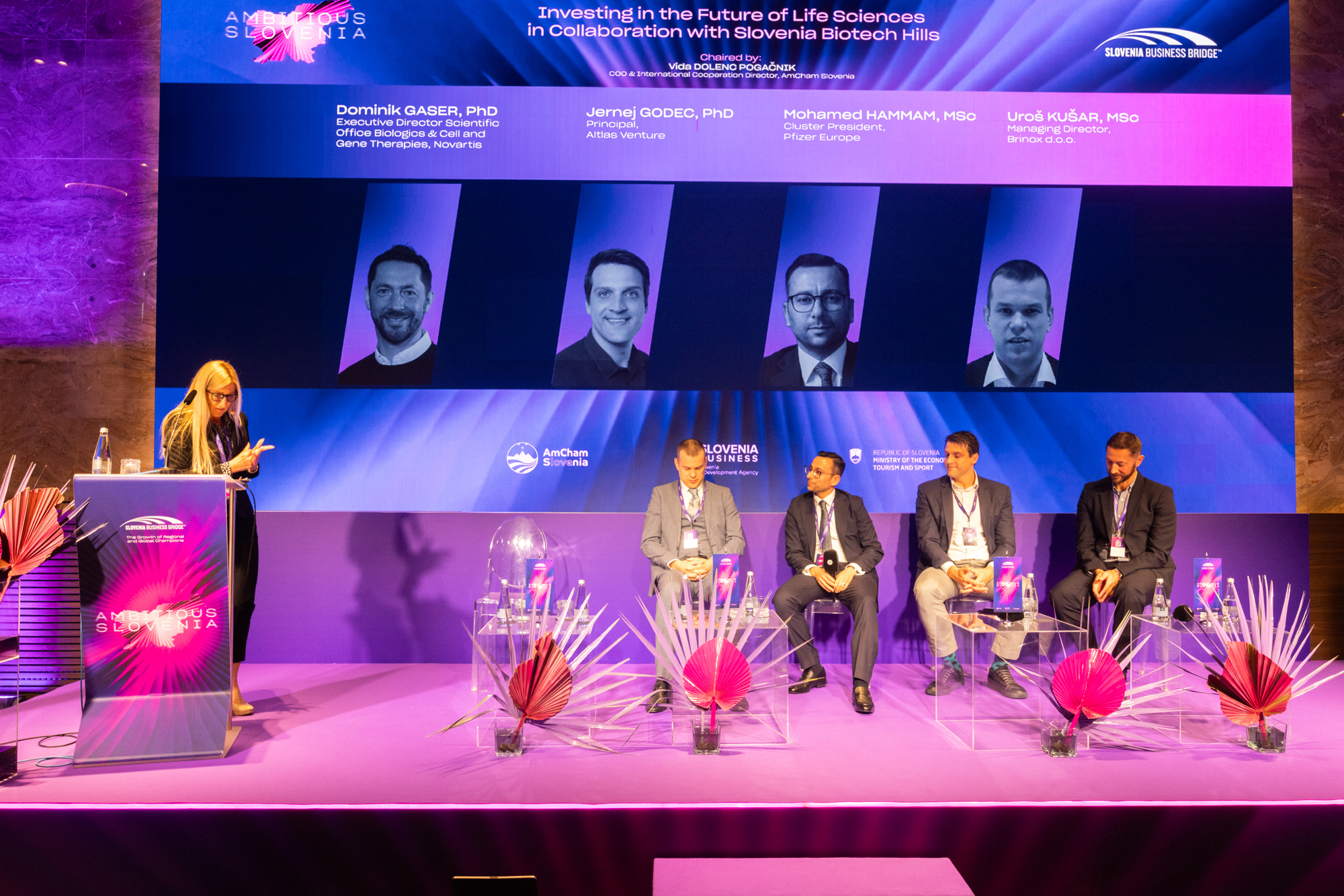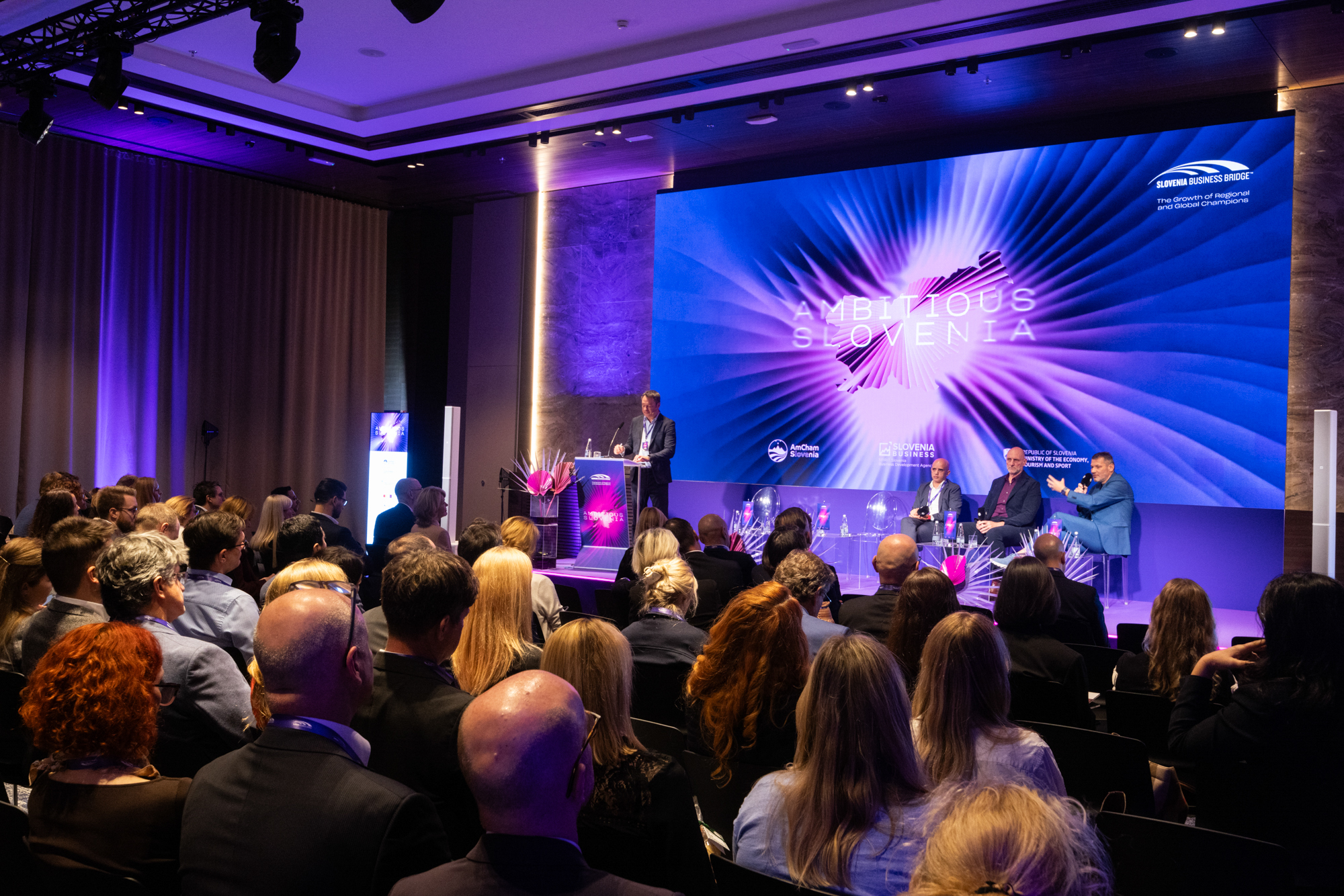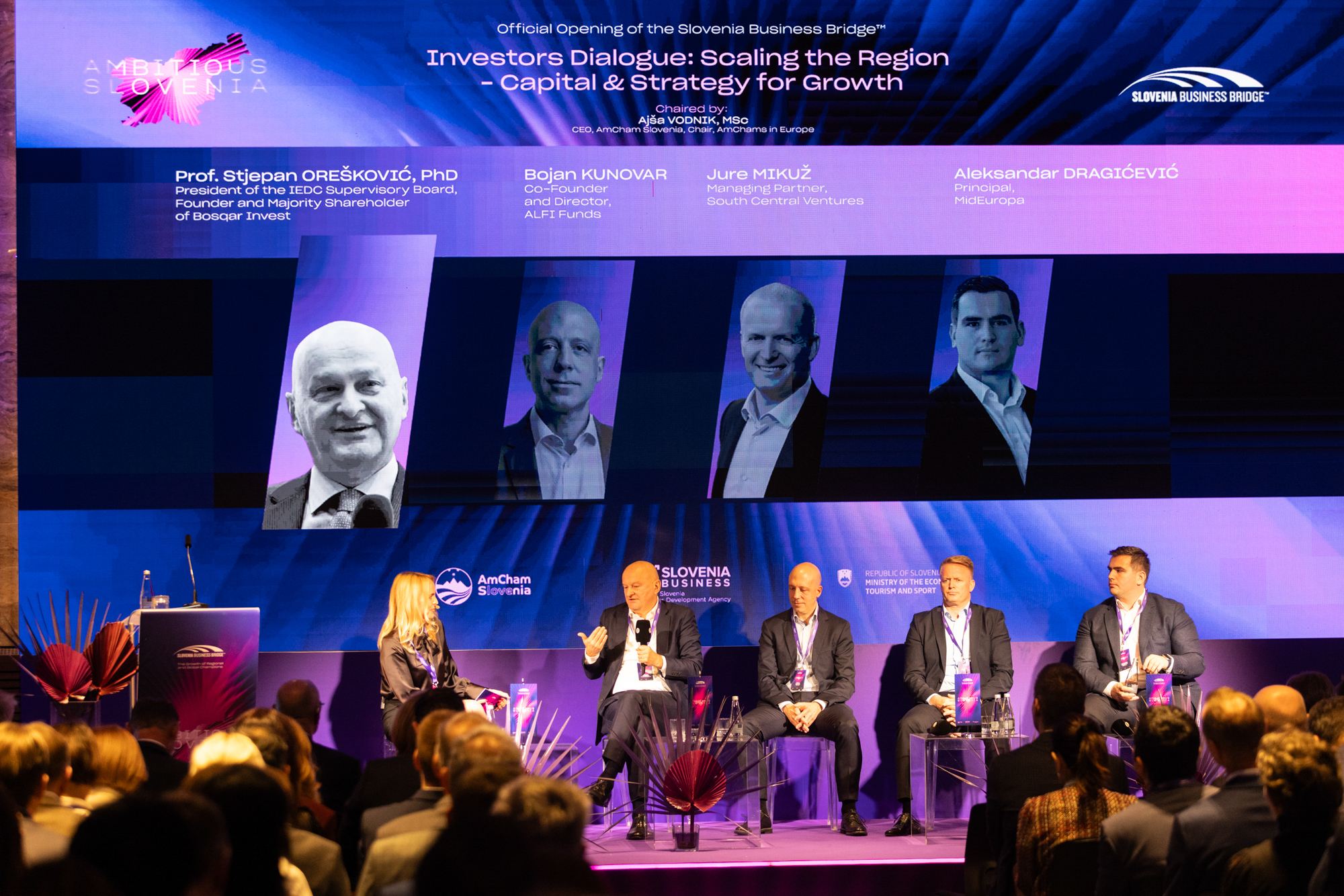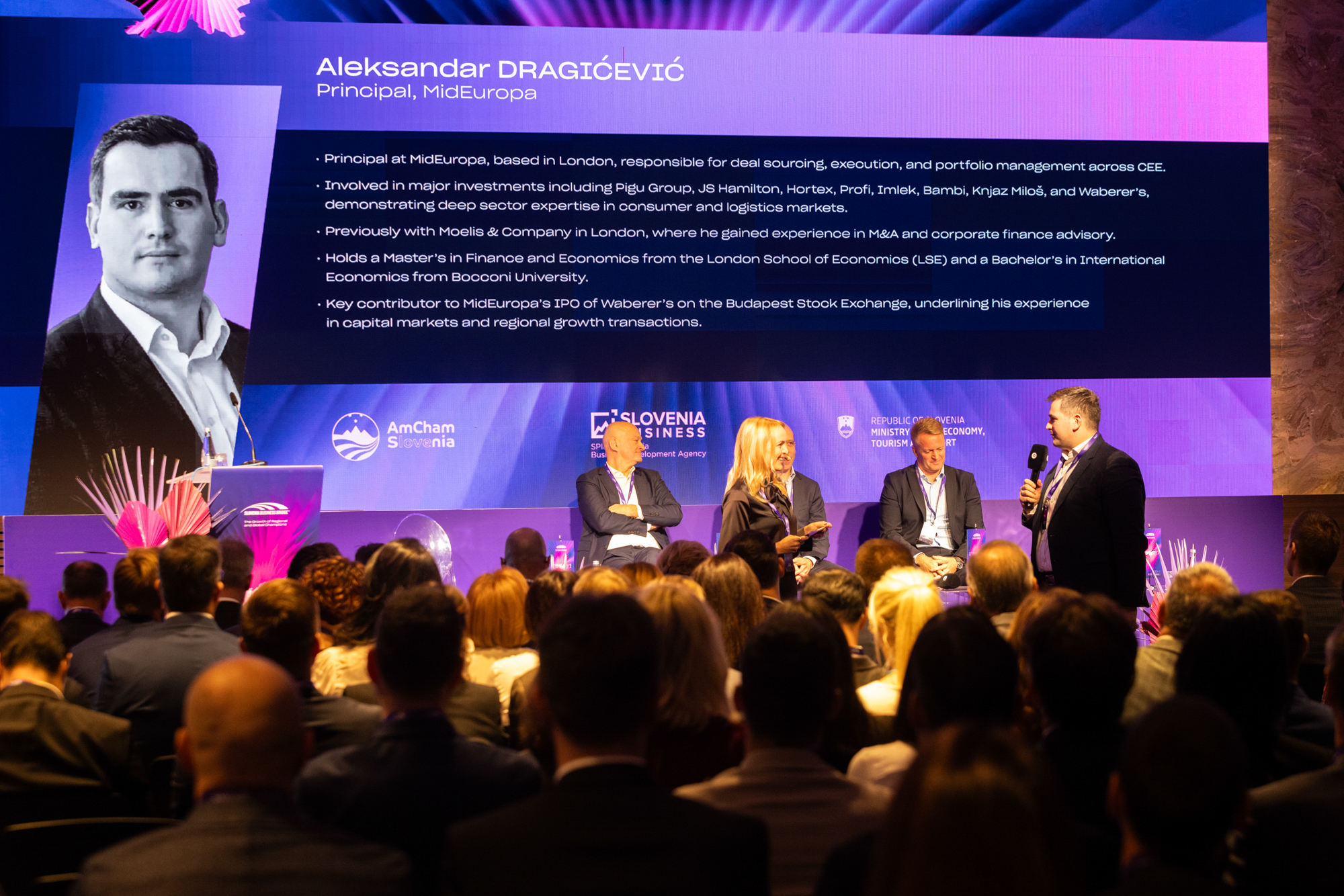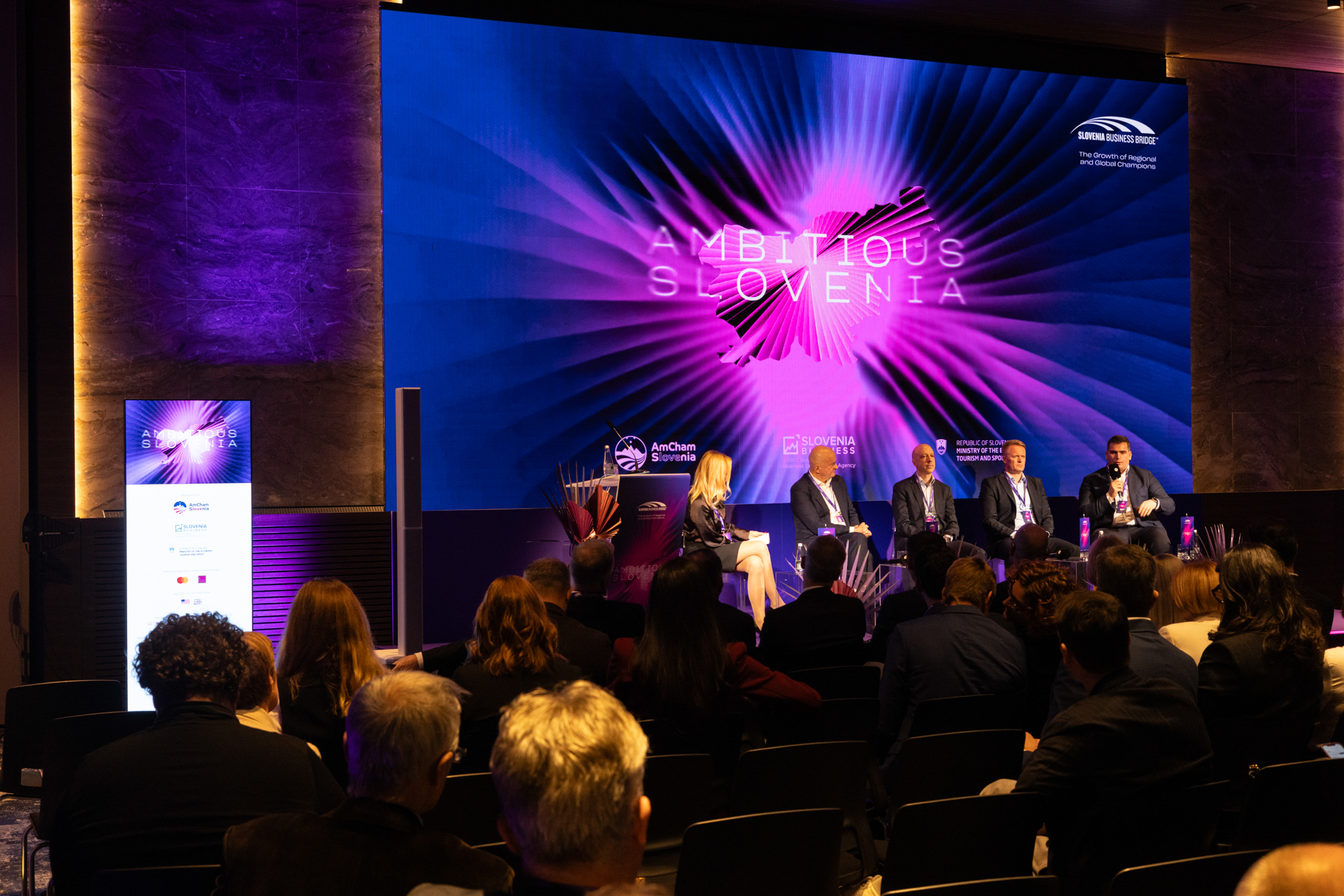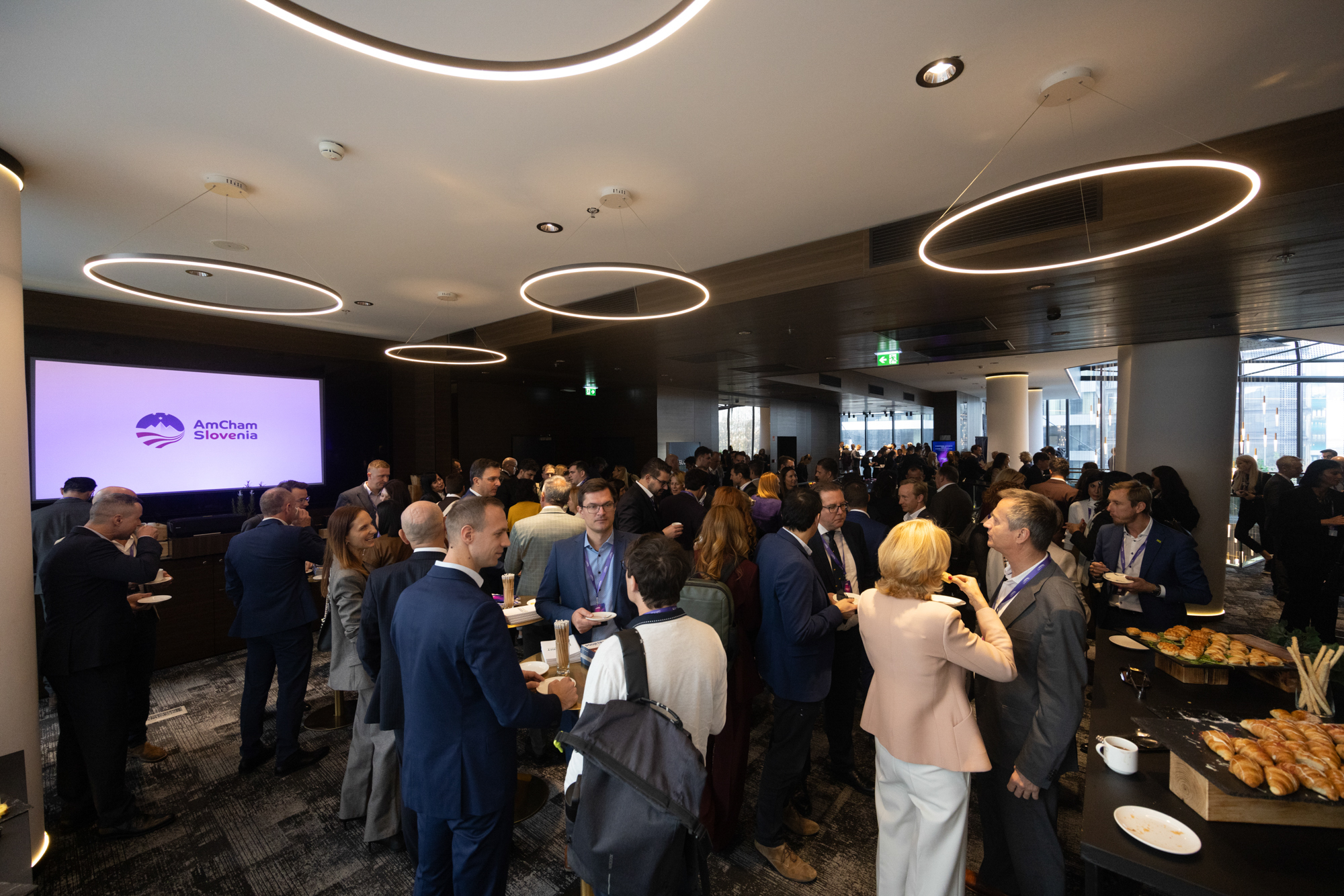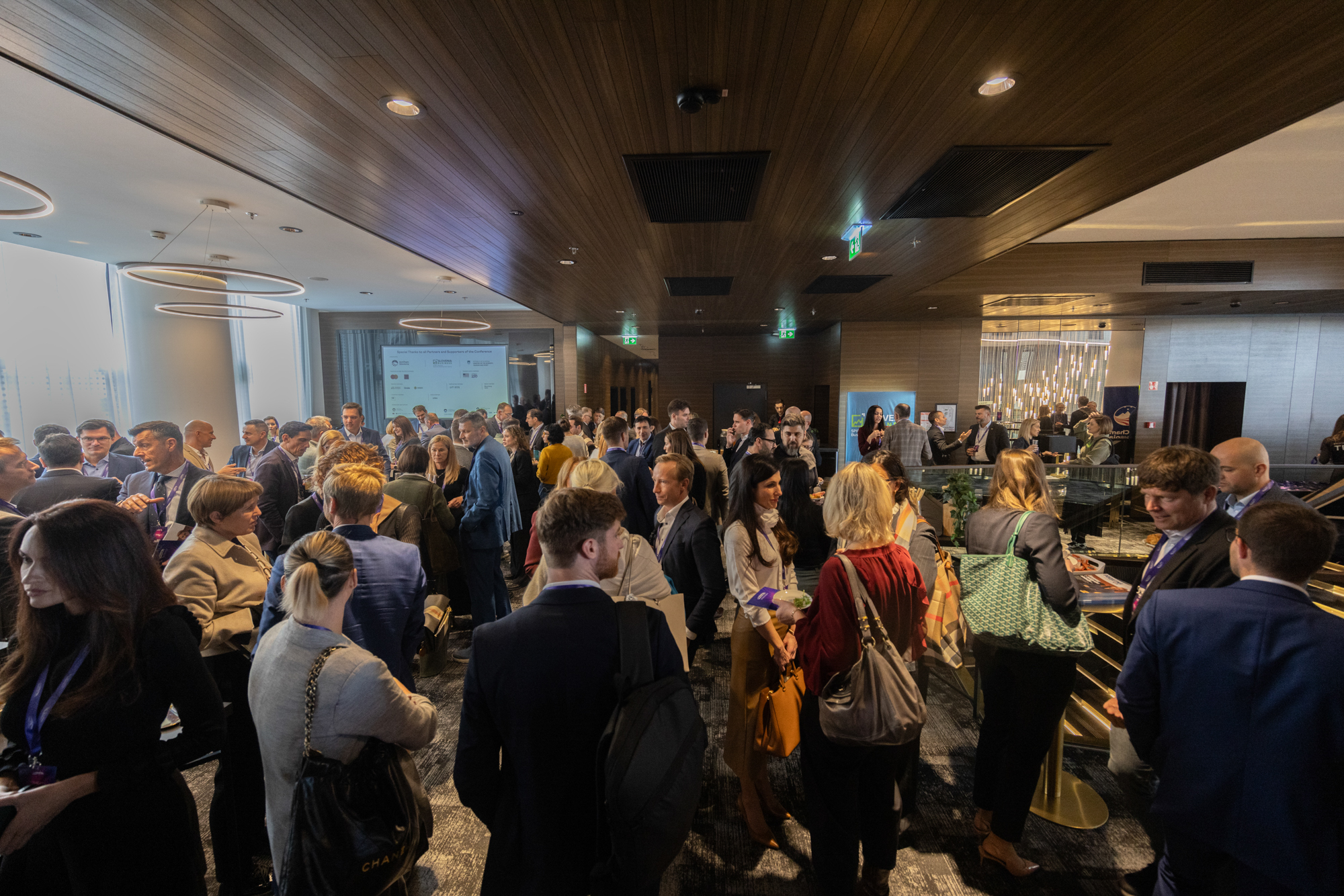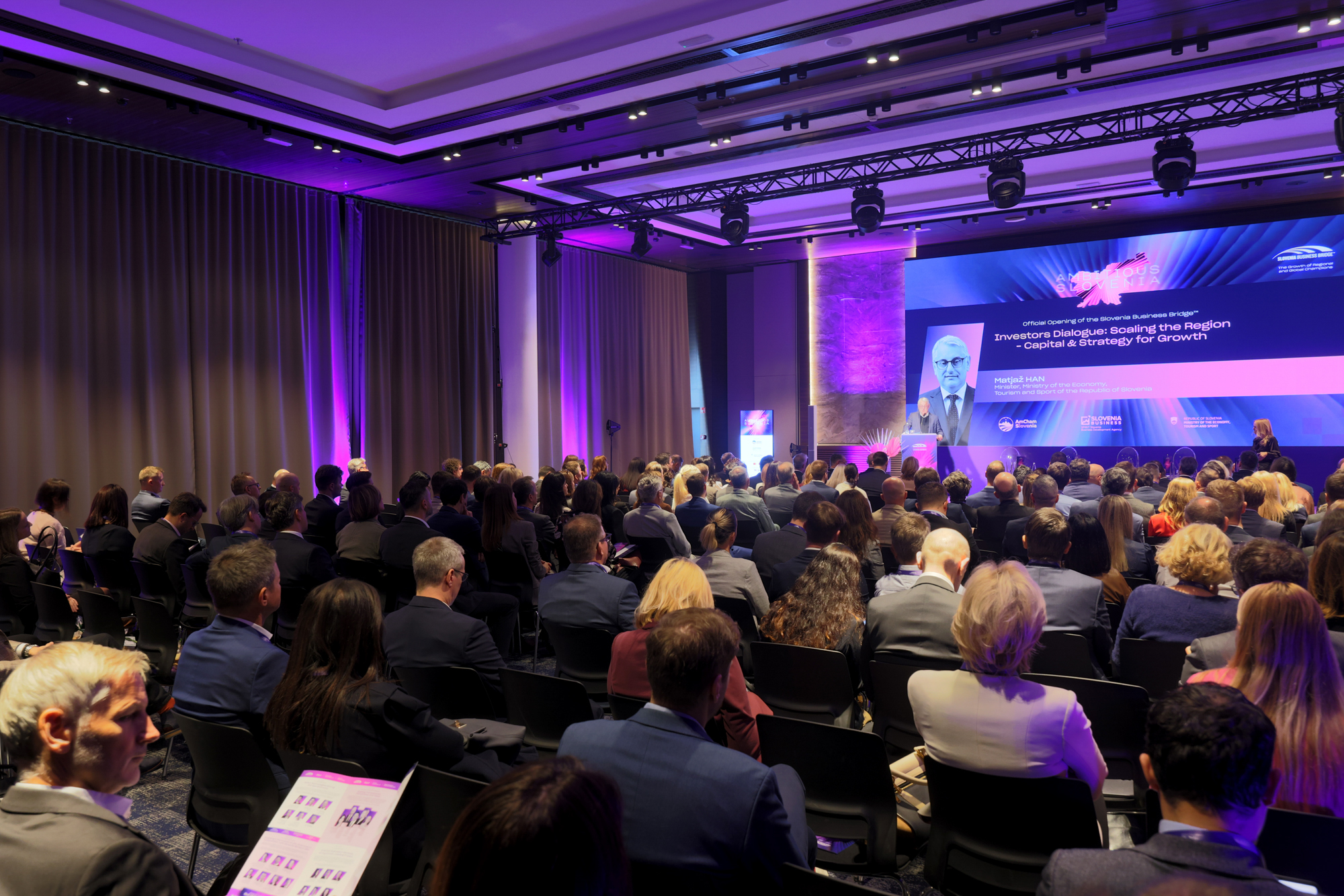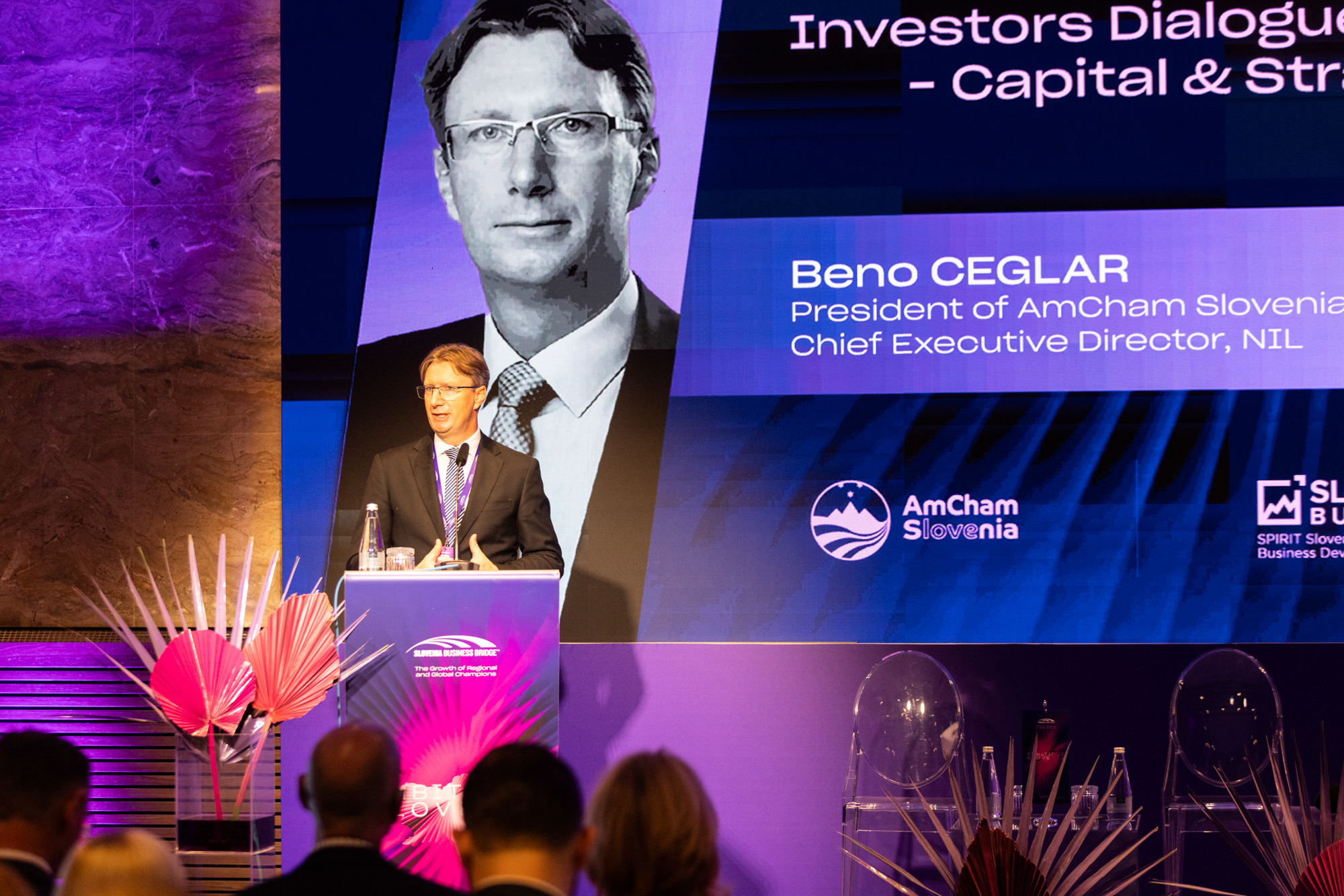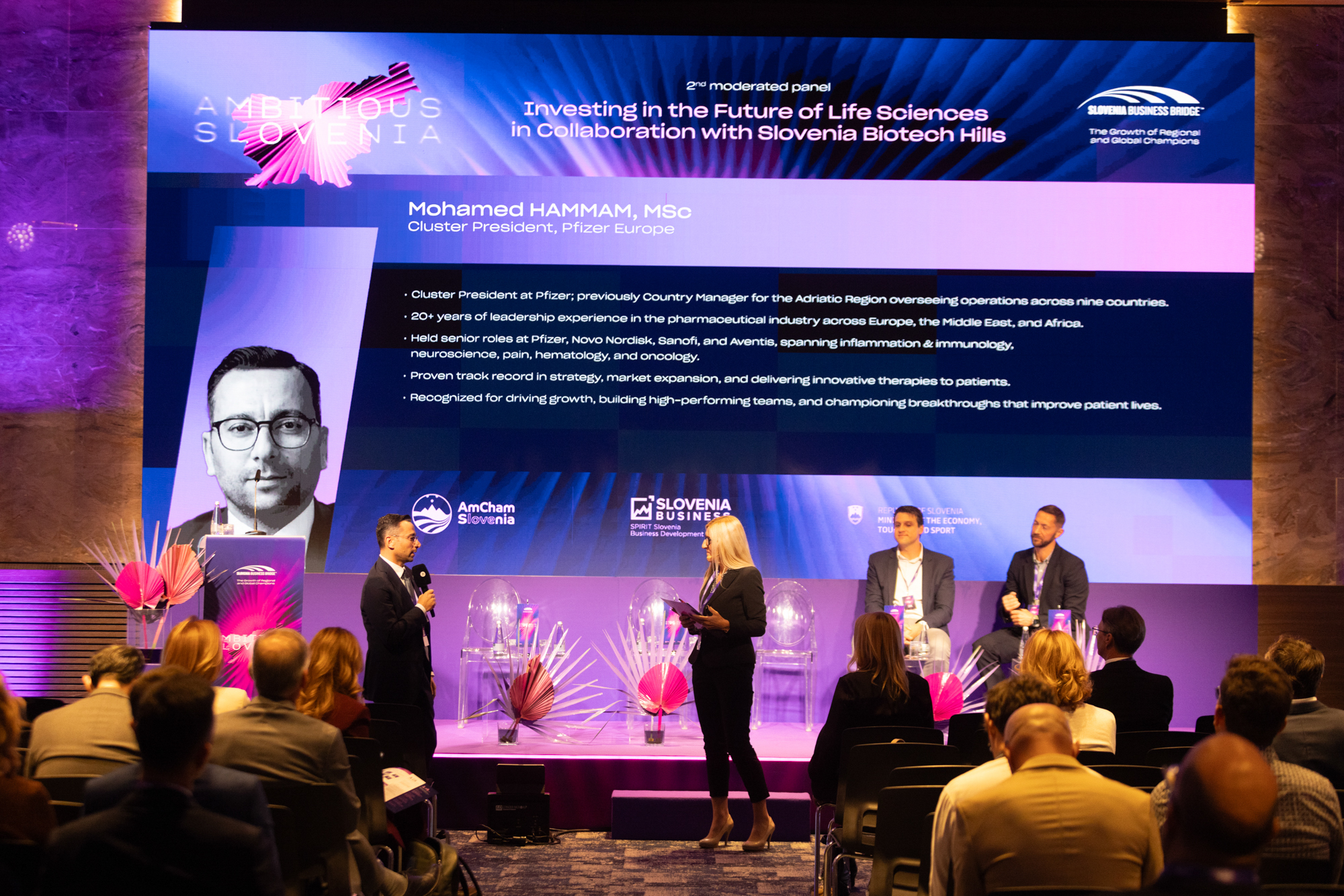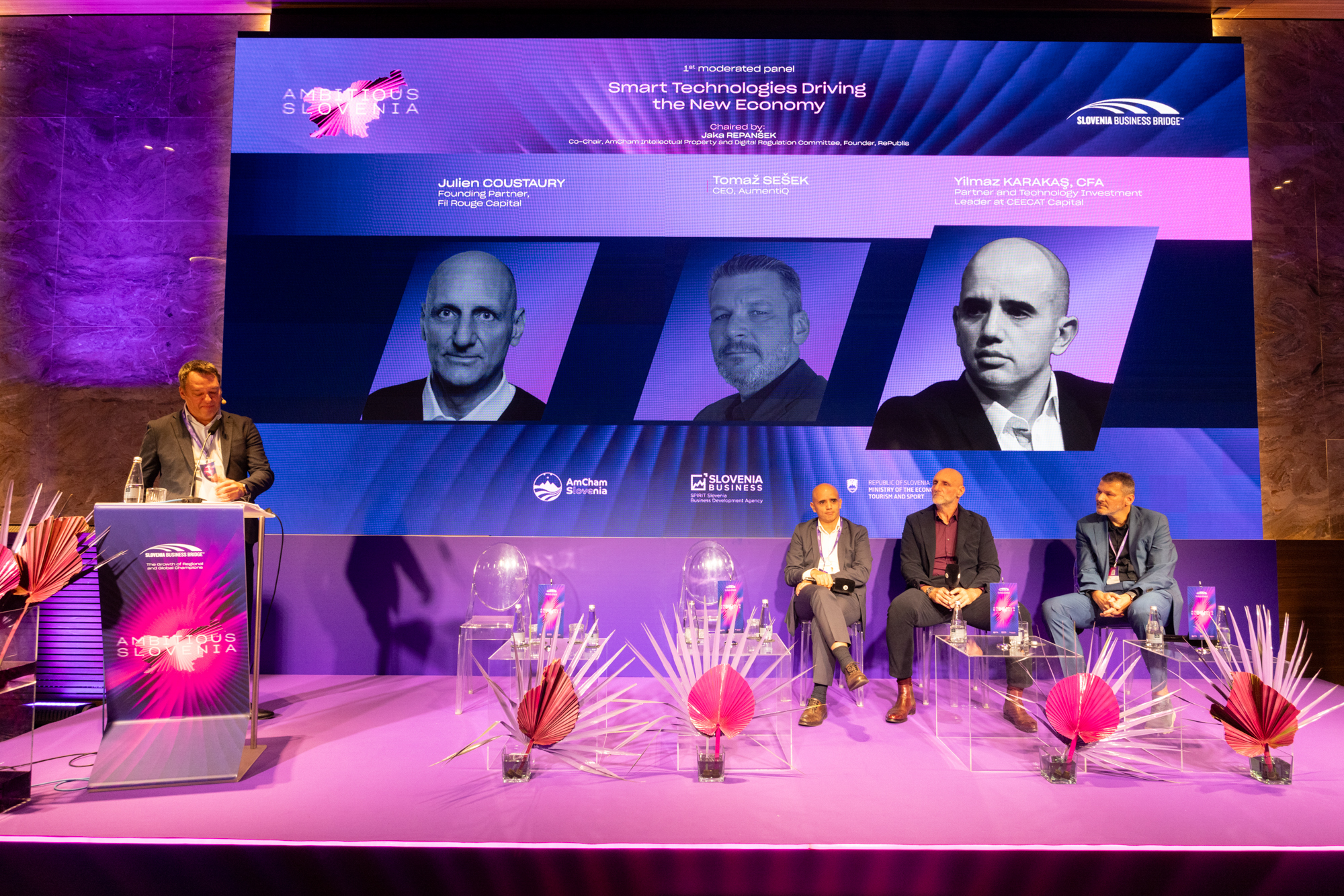Slovenia is a reliable partner that knows how to “play the global game,” but it must build its ambitions on smart regulation, predictability, regional opportunities, and long-term strategic direction.
At the 8th investment and development conference Slovenia Business Bridge™, held on November 13 and 14 in Ljubljana under the title “Ambitious Slovenia: The Growth of Regional and Global,” more than 40 speakers focused on strengthening the strategic ecosystem that enables local companies to break into regional and global markets and attract foreign direct investment.
Across the individual panels, we emphasized the importance of ambitious strategies and transatlantic partnerships, advanced technologies and smart regulation, innovation, and talent attraction. We addressed topics such as investing in the future of life sciences in collaboration with Slovenia Biotech Hills, the challenges of breaking into the extremely demanding US markets in cooperation with the USA Navigator platform, and the key strategies that give US states their competitive edge. The discussion showed that Slovenia, despite its talent and potential, still has room to improve in establishing a clear strategic framework (without legal and tax surprises), adopting a bolder capital policy, and overcoming psychological barriers that hold entrepreneurs back from entering the global stage.
The event featured more than 40 speakers—industry experts, including representatives of global giants (Novartis, IBM, Microsoft, Pfizer)—who discussed how Slovenia, with its remarkable potential and skilled workforce, can become a regional champion. More than 400 participants had the opportunity to exchange best practices for strengthening local, regional, and global economies.
The first day introduced a new dynamic: in cooperation with Labena Ventures, we presented the Slovenia Business Bridge Challenge for the first time—an exceptional opportunity for breakthrough innovators to showcase their solutions to an exclusive circle of international investors and business leaders. At the business dinner, we announced the startup that impressed investors the most: iPASy Technologies, which addresses challenges related to prostate cancer.
The second day was entirely dedicated to transatlantic cooperation, insights into the US markets, and the importance of the US-EU partnership for growth, stability, and innovation. At the conclusion of the two-day event, the conference’s key messages became unified: Slovenia and the broader Central and Eastern Europe (CEE) region possess extraordinary potential that must be encouraged with confidence, as it is stronger than we often acknowledge. The emphasis was placed on the idea that ambition and heart must go together, that young value-driven leaders are already writing the stories of the future, and that foreign direct investments bring much more than capital—they bring innovation, global reach, and new perspectives. The conference reaffirmed the conviction that a team working with heart can achieve absolutely anything.
Panel: “Scaling the Region – Capital & Strategy for Growth”
The 8th Slovenia Business Bridge™, organized by AmCham Slovenia in cooperation with SPIRIT Slovenia and the Ministry of Economy, Tourism and Sport, began with the official opening event “Scaling the Region – Capital & Strategy for Growth,” bringing to the stage speakers who, with concrete ambitions, opened a discussion on how Slovenia and the broader region can step onto the path of true regional champions.
Ajša Vodnik, CEO of AmCham Slovenia, emphasized in her introduction that ambition is part of the Slovenian identity, both in sports and in business. Matjaž Han, Minister of the Economy, stressed that Slovenia is not small, but smart—built on knowledge, innovation, and people who know how to collaborate. He highlighted trust and stability as the key currencies of today. Slovenia, he said, is a reliable partner that knows how to play the “global game,” but must build its ambitions on solid foundations and long-term strategic direction: “Slovenia is a partner you can trust—we are reliable, responsible, and always solution-oriented. Thank you to the AmCham team for building bridges between people, bridges on which we have the opportunity to build a better world.”
Beno Ceglar, President of AmCham Slovenia, defined ambition as courage, vision, and the readiness to shift the status quo. He stated that Slovenian business is prepared, connected, and determined to grow.
Investors, business leaders, and policymakers spoke about why, despite talent and innovation, too little strategic capital still flows into Slovenia. Simon Savšek, PhD (EIB) noted that Slovenian companies still have significant potential, as they innovate above the European average, but the country lacks a concrete, coherent capital strategy, and access to external growth capital remains limited. He emphasized the need to develop the venture capital and private equity ecosystem and highlighted opportunities in technology transfer and succession of successful companies. Rafael Szczepaniak (UniCredit) called on Slovenian leadership to learn from Lithuania’s more aggressive measures (e.g., special economic zones with exceptional tax incentives). Albert Birkner, PhD (CERHA HEMPEL) stressed the importance of legal predictability, stability, and efficiency, as investors must trust that the legal regime will not significantly change during their investment period.
Prof. Stjepan Orešković (Bosqar Invest, IEDC) described Slovenia as a “natural choice” for investment: a stable market, an industry they know well, and people with whom—“it is possible to work quickly and easily.” He critically pointed out that one of Europe’s biggest psychological problems is self-perception.
Jure Mikuž (South Central Ventures) confirmed that Slovenia’s ecosystem has evolved significantly over the last 15–20 years. Innovators today are better prepared for commercialization, thanks in part to government programs and successful entrepreneurial exits that now reinvest into the community.
Panel: “Smart Technologies Driving the New Economy”
Artificial intelligence, advanced manufacturing, and data-driven solutions are redrawing the boundaries of global competitiveness. Mark Boris Andrijanič (EIT) cautioned that despite good strategies, results must be taken into account. The EU focuses on complex regulation but lags behind the US and China in technological competitiveness, as confirmed by the Draghi report—but the opportunity is not lost. Slovenia, he said, “has all the conditions to remain one of the most spectacular small economies in the world,” provided it becomes more agile, business-oriented, and wisely regulated—not overregulated. He sees the true transformative power of AI in its application within Slovenia’s traditional strong industries, such as manufacturing and pharmaceuticals, increasing productivity.
Julien Coustaury (Fil Rouge Capital) cited human capital as Slovenia’s main advantage: a strong education system, excellent developers, and outstanding work ethic. He also warned that the country still lags behind in digital literacy at the school level. Yilmaz Karakaş (CEECAT Capital) highlighted a worrying statistic: one in five startups that raise more than one million euros relocate to Western Europe or the US. The key reason is the lack of growth capital.
Panel: “Investing in the Future of Life Sciences in Collaboration with Slovenia Biotech Hills”
Slovenia has the talent, tradition, and research excellence to become the Biotech Hub of Central Europe. Despite investments exceeding 2.5 billion euros, structural challenges remain. Boštjan Čeh (Labena, Slovenia Biotech Hills) stressed that attracting highly skilled foreign talent will be essential for global competitiveness and that Slovenia must significantly improve the bridge between laboratory innovation and commercialization. One of the biggest obstacles, he said, is the uncompetitive taxation of labor. Minister Papič agreed that the country simply “does not have enough people” for engineering and natural science fields. He highlighted the necessity of attracting more foreign students and graduates.
Panel: “Building Transatlantic Partnership and Value”
The second day began with a clear message: the partnership between the US and Europe is essential for growth, stability, and innovation. Brian Greaney (US Embassy) confirmed that the US values Slovenia’s high educational level, fluent English proficiency, and strong research culture. Katarina Kresal (Senica & Partners Law Firm) emphasized: “History teaches us that any society wishing to avoid decline must remain open and strive for cooperation in retaining talent.”
Tamara Zajec Balažič (SPIRIT Slovenia) explained that Slovenia is consistently presented abroad as part of a safe European framework, with a favorable geostrategic position—largely thanks to the Port of Koper, the fastest route from Asia—and a highly qualified workforce.
Panel: “American Business in Slovenia: Driving Growth, Creating Impact”
A discussion among leading representatives of American companies with significant business and social impact in Slovenia revealed why Slovenia is becoming an increasingly attractive destination for US investments, how Slovenian companies can integrate into US ecosystems, and which opportunities are shaping the future of transatlantic business. Jim Bureau (Loftware) emphasized that Americans value not just Slovenian talent but also Slovenia’s geographical position within the EU and its cultural agility. Slovenian experts are unique because they know how to navigate Slovenian, Austrian, German, and Italian culture—an essential capability for global business.
Panel: “Cracking the US Market: Your Key to Global Growth”
The main message of the panel was that companies should not treat the US as a single market, but as an entire continent – and a mindset. Leon Korošec (Elan) highlighted that in the US, company size does not matter—what matters is relevance. The US market respects manufacturers with a clear value proposition, a strong story, and strong heritage. “If you prove you know what you’re talking about, they will listen,” he said. He also emphasized that success depends on a pragmatic approach, collaboration with local teams, and the courage to connect Slovenian narratives with American thinking. Jure Andročec (Litostroj Power) noted that European companies often surprise the US market with their quality and engineering standards – Americans appreciate this. He described Slovenia as “difficult” due to high bureaucracy, but said this trains precision: “In Europe, we are resilient – we know how to tackle things, and in the US, they value that.” He added that once the market recognizes added value, it is ready to buy.
Panel: “USA Navigator – Find Your Business Match”
The closing panel of the Slovenia Business Bridge™ conference, “USA Navigator – Find Your Business Match,” was dedicated to interactive exploration and identifying the right U.S. states, sectors, and partners for the expansion of Slovenian companies into the United States.
State representatives presented Slovenia with four main models: Virginia is ideal for highly regulated industries (pharmaceuticals, aerospace, data centers) due to its proximity to Washington D.C. and strong East Coast logistics; South Carolina is a hub for automotive and aerospace manufacturing and the fastest-growing region in the U.S.; Pennsylvania, with its long industrial tradition and top-tier science (AI, biosciences), offers a highly educated workforce; and Nevada is transforming into a startup and high-tech hub (in addition to gaming), where strong community interconnectedness is crucial for market entry. All representatives agreed that Slovenian companies quickly become “American” in the U.S. market and are treated as local businesses, with European quality and engineering standards highly valued.
